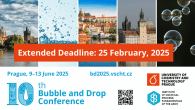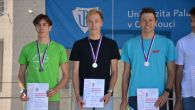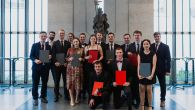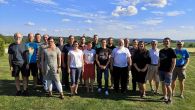- About the programme
- Admissions are open from December 1 to January 31
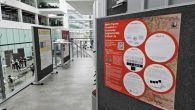
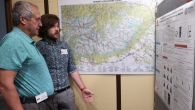
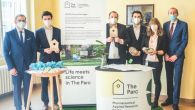
 Bubble and Drop Conference 2025We are co-organizing a conference in June in Prague. Join us!
Bubble and Drop Conference 2025We are co-organizing a conference in June in Prague. Join us!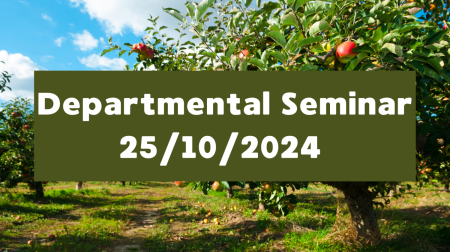 Invitation
InvitationDear friends,
I would like to once more invite you to our previously cancelled departmental seminar with an invited talk by Dr. Nicholas Scott Lynn Jr. (Institute of Physics, Czech Academy of Sciences) who will present a lecture on Microfluidic-based Synthesis of Polymer Brushes - Applications in Biosensing and Beyond. Abstract of the talk is attached to this e-mail.
The seminar will take place next Friday, on 25 October, at 11:00 am in the room B028.
As usual, refreshments will be served, so do not forget to bring your cups!
With best regards,
Sasha
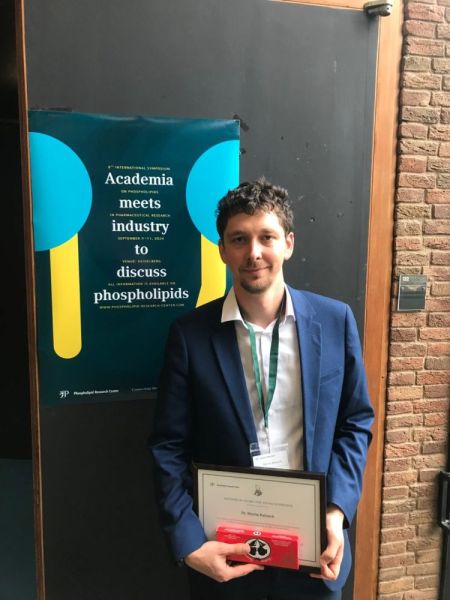 Thudichum Young Scientist Award
Thudichum Young Scientist AwardMany congratulations to Martin Balouch for winning the 2024 Thudichum Young Scientist Award, presented bi-annually by the Phospholipid Research Centre to young scientists who have performed excellent research on phospholipids and have published their findings in renowned scientific journals. The award is named after the German physician and biochemist Johann Ludwig Wilhelm Thudichum (1829–1901) who pioneered phospholipid research while investigating the chemical composition of the brain. Martin received his award for his original research on drug permeation across lipid bi-layers, computational prodrug design, and co-permeation. Many congratulations for this well-deserved award!
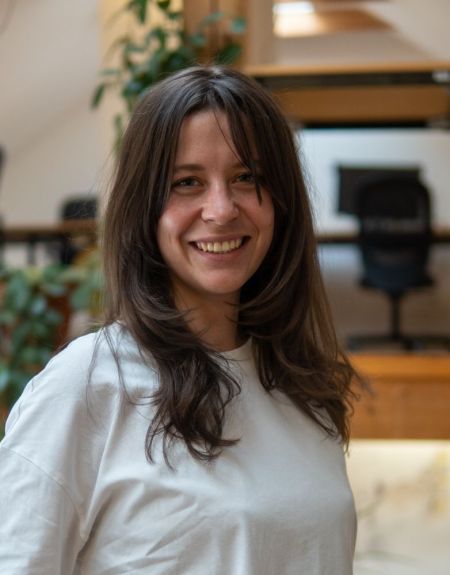 Welcoming Anna Vanluchene
Welcoming Anna VanlucheneWe are delighted to announce that Anna has returned to her alma mater, now in the role of Assistant Professor. Anna completed her Master's Degree in Chemical Engineering at UCTP. She then pursued a double Ph.D. between UPMC in Paris and UCTP, funded by the French government. Her doctoral research, completed in 2018, focused on the synthesis of compartmentalized microparticles for targeted drug delivery using microfluidic chips.
After her Ph.D., Anna took maternity leave and held a part-time position at the Institute of Chemical Process Fundamentals CAS, where she worked on photocatalysis in microflow reactors. In 2022, her project, ElectronsOnRun, which explores electrochemical fluorination under microflow conditions, was awarded a two-year Marie Skłodowska Curie Actions (MSCA) Postdoctoral Fellowship at Ghent University.
Starting in September, Anna will join our department as an Assistant Professor, where she will focus on leveraging chemical engineering for advancements in Green Chemistry, specifically photochemistry and flow chemistry in microreactors. We warmly welcome her back and wish her much success in her new role!
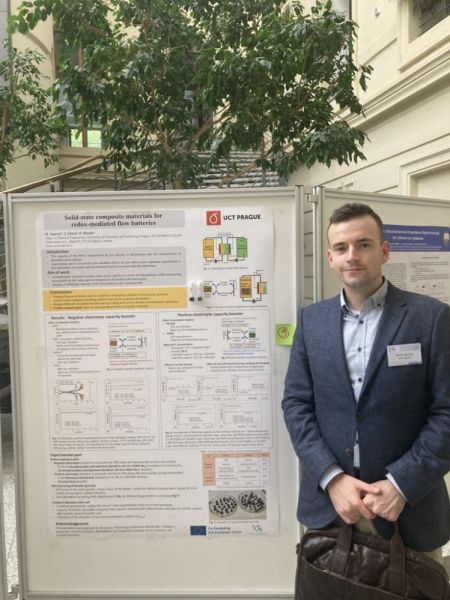 Poster Award
Poster Award Our PhD student Martin Spurný from KosekGroup placed 4th in the competition called “The Young Scientist Best Poster Award” at ABAF (Advanced Batteries, Accumulators and Fuel Cells) 2024 conference in Brno, Czech Republic with his poster entitled Solid-state composite materials for redox-mediated flow batteries. Congratulations!
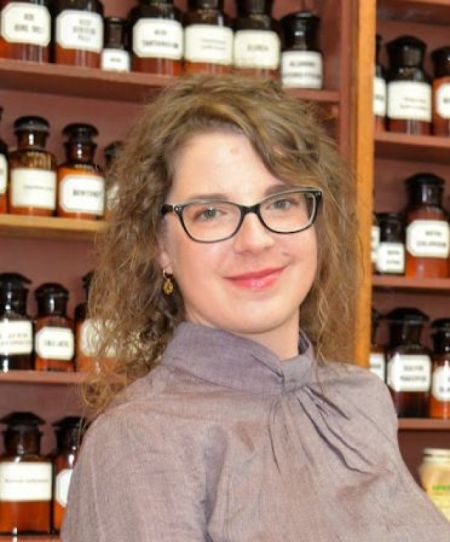 We welcome Emilia Jakubowska
We welcome Emilia JakubowskaEmilia Jakubowska is a pharmacist by training and since 2016 has worked in research & teaching at the Chair and Department of Pharmaceutical Technology, Poznan University of Medical Sciences in Poland. Her main research interests revolve around particle engineering, crystallisation and technologies for dissolution enhancement (PhD thesis on development and characterisation of cilostazol nanocrystals, 2023). She has led a project funded by National Science Centre Poland and co-managed a H2020-MSCA-RISE project 'ORBIS' (778051). Emilia has experience in cooperation with pharmaceutical industry gained during collaborative projects and internships, such as APC Ltd. (Dublin).
At UCT, Emilia is doing a postdoctoral fellowship under Maria Sklodowska-Curie Actions (HORIZON-MSCA-2023-PF-01) on ManCoProc project (101152117) - 'Advanced manufacturing of drug substances by co-processing with excipients through heteronucleation in a milifluidic device'. ManCoProc is supervised by prof. Ing. Frantisek Stepanek and involves collaboration with Zentiva, where Emilia will complete the final part of the research. The overarching goal of this work is to develop a method for co-processing active pharmaceutical ingredients (APIs) with excipient particles in order to improve their flow and mechanical properties. The project will contribute to improving drug manufacturability in the context of the ongoing switch in pharma industry to continuous manufacturing approach.
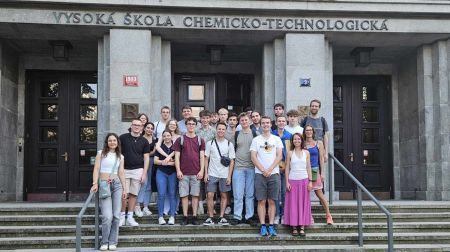 Summer Program for High School Students
Summer Program for High School Students Best Poster Award at ALIFE 2024 Conference
Best Poster Award at ALIFE 2024 ConferenceA huge congratulations to Nina Nováková! At the ALIFE 2024 conference on artificial life in Copenhagen, her poster summarizing the results of her paper "Myelin Figures Formation from Oil Droplets in Surfactants: Insights for Wet Artificial Life" (co-authors Jan Macháček and Jitka Čejková, MIT Press Artificial Life Conference Proceedings 2024) won the award for the best student poster at the conference. Well done, Nina, keep going!
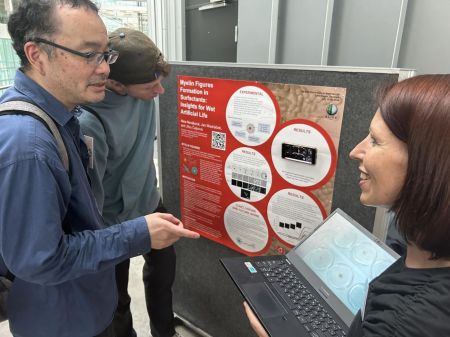
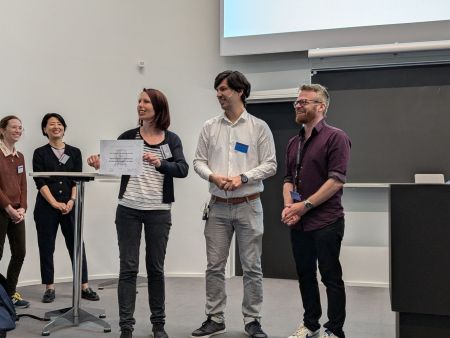
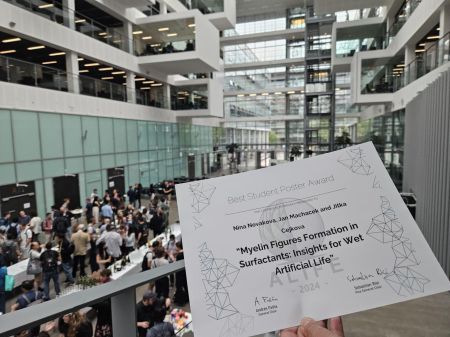
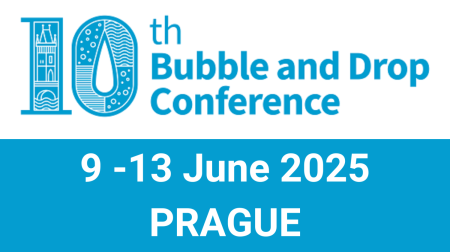 First CallPavlína Basařová and Jitka Čejková will organize a conference in Prague next year
First CallPavlína Basařová and Jitka Čejková will organize a conference in Prague next year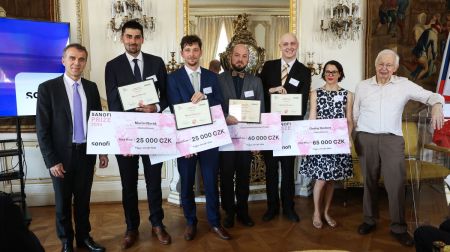 Sanofi Prize for Pharmacy
Sanofi Prize for PharmacyMany congratulations to Martin Balouch from the group of Prof. František Štěpánek for winning 3rd place in the Pharmacy category (Sanofi Prize), one of several Scientific Prizes awarded annually by the French Embassy in Prague. Martin was nominated for his PhD thesis titled “Investigation of mass-transfer properties and permeability control of phospholipid bi-layers” and received his prize at a ceremony in the presence of Nobel Prize laureates including prof. Jean-Marie Lehn. Congratulations for this well-deserved award!
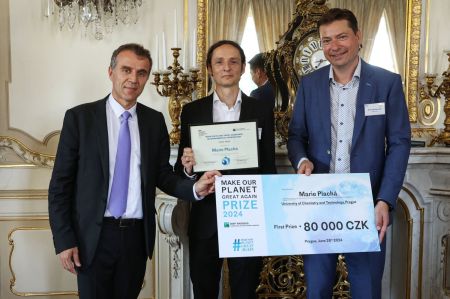 "Make Our Planet Great Again" Award
"Make Our Planet Great Again" Award Congratulations to Ing. Maria Plaché, Ph.D. from the group of Prof. Petr Kočí from the Department of Chemical Engineering, who with her dissertation thesis "Modelling of transport and reaction in porous catalytic filters using 3D computer reconstruction" won the 1st place in the scientific competition of the French Embassy in the category "Make Our Planet Great Again - Prize in Environmental Sciences". The prize was accepted by her supervisor Prof. Petr Kočí (in the middle of the photo, photo: © Ondřej Besperát).
The Make Our Planet Great Again Prize for Environmental and Climate Research is organised by the Embassy of France in the Czech Republic together with BNP Paribas. This prize aims to reward the research work of Czech students in the field of climate change, environment and sustainable development. The winners will receive financial assistance and the first two will also have the opportunity to complete an internship in a research laboratory in France. The prize was awarded during a reception at the French Embassy in Prague, Buquoy Palace, chaired by Professor Jean-Marie Lehn, Nobel Prize winner in Chemistry, and the Ambassador. Make our Planet Great Again is an initiative of the President of the French Republic, Emmanuel Macron, launched on 1 June 2017 following the decision of the United States to withdraw from the Paris Climate Agreement. It is a call for researchers and teachers, entrepreneurs, associations and NGOs, students and all civil society to mobilize and join France in the fight against global warming.

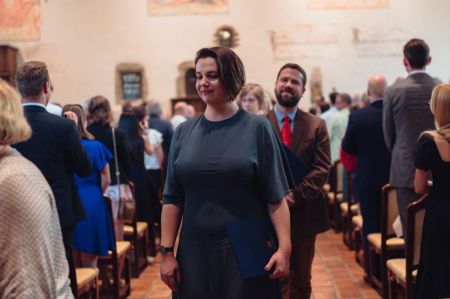 Graduation ceremony in Bethlehem Chapel
Graduation ceremony in Bethlehem ChapelOn Tuesday, 25 June 2024, a graduation ceremony was held in Bethlehem Chapel, during which two new habilitated associate professors from our department, Assoc. Prof. Viola Tokarová and Assoc. Prof. Alexandr Zubov. The diplomas were also received by fresh PhD graduates. As part of the Master's graduation ceremony, when diplomas are awarded to new engineers, the ceremony of awarding medals of the Faculty of Chemical Engineering to three outstanding personalities who have contributed to the development of our faculty was held for the third time. The Dean of the Faculty, Prof. Michal Přibyl, personally presented the medal for outstanding organizational activities to Ms. Michaela Javorská from our department. Congratulations to all the awardees! We wish the new engineers and fresh PhD graduates every success in their future career, personal life and further scientific activity.
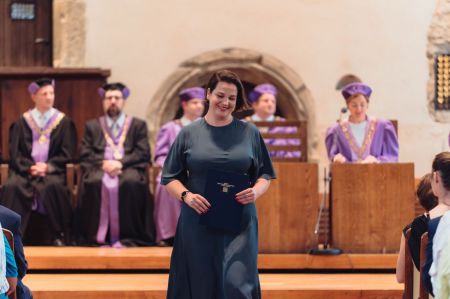
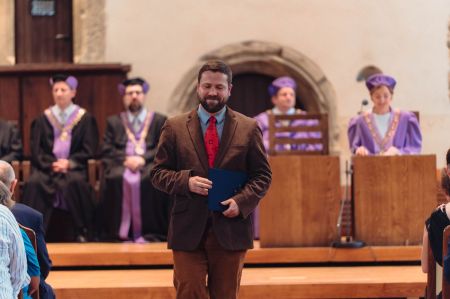
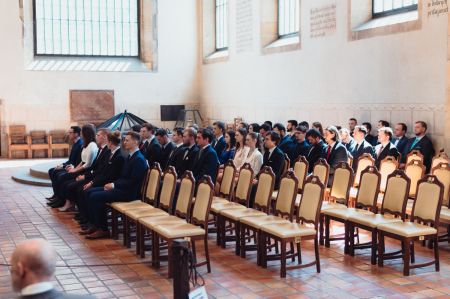
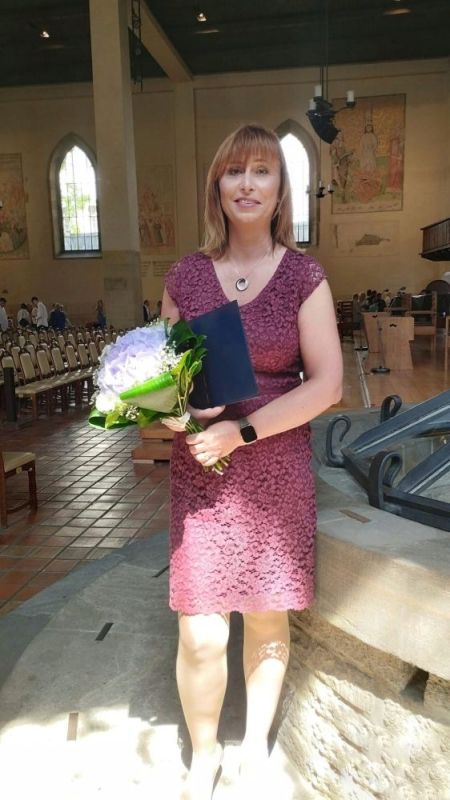
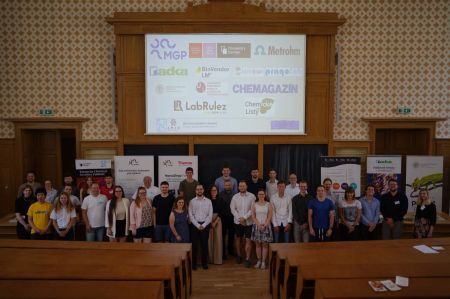 Conference "Growing with Chemistry"
Conference "Growing with Chemistry"The second edition of the conference "Growing with Chemistry" took place on 27-28 June 2024 at the Faculty of Science of Charles University in Prague. This event was primarily aimed at young chemists under 35 years of age. The organizers managed to follow up on last year's successful event, which started a common meeting, discussion, networking and mutual motivation. Once again, the motto of the conference "Growing with Chemistry" was successfully lived up to. Several students from our faculty represented the University of Chemical Technology in Prague at this event. The two-day student meeting benefited from the support of the Faculty of Science of Charles University, the Czech Chemical Society and other sponsors and partners, which ensured a valuable experience for all participants. The prize for the best lecture and poster was sponsored by Metrohm. In addition, three honorary prizes were awarded. The winners received a one-year membership to the Czech Chemical Society and gifts from the sponsors. We are proud that one of these prizes was awarded to Nina Nováková from the Department of Chemical Engineering for her lecture "Biomimetic behaviour in chemical systems: formation of myelin figures" (co-authored by her supervisor Jitka Čejková and Jan Macháček). This award highlights the quality and impact of her work. We congratulate Nina and thank all the participants from our faculty for their exemplary representation of VŠCHT Praha.
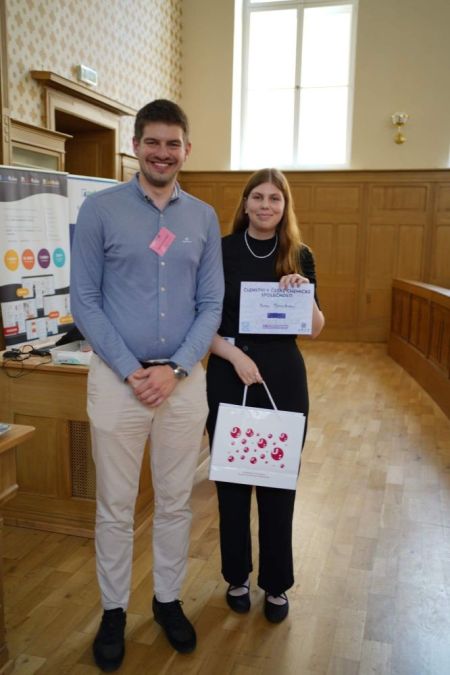
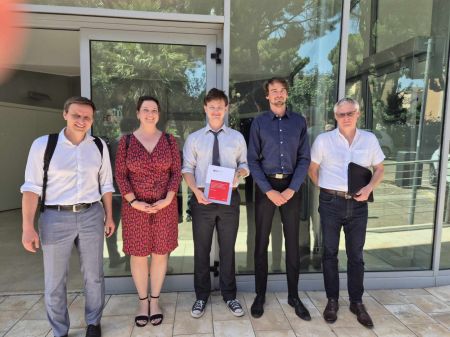 Two new graduates
Two new graduatesOur students, Daniel Bambas and Dan Unzeitig, successfully defended their theses and passed their final state exams with honors on June 10, 2024. As a result, they earned a double degree in engineering from the University of Cagliari and the University of Chemistry and Technology, Prague. Both students spent the last year at Università degli Studi di Cagliari (UniCa), where they completed their theses.
The double degree program "Chemical Engineering and Bioengineering" is conducted in cooperation with Università degli Studi di Cagliari (UniCa) in Italy. Students receive degrees from both UCT Prague, where the title of Inženýr (“Ing.”) is awarded upon completion of the Master's degree program in "Chemical Engineering and Bioengineering," and from UniCa, where they are awarded the title Laurea magistrale in Ingegneria Chimica e dei Processi Biotecnologici (Master of Science in Chemical Engineering and Biotechnological Processes), with the academic title "Dottore Magistrale." The length of study is 2 years, which corresponds to 4 semesters and 120 ECTS credits. Students spend the 3rd and 4th semesters at UCT Prague, earning 60 ECTS credits. The contact persons at UCT Prague are Assoc. Prof. Zdeněk Slouka for organization and study plans and Adéla Habartová for the application process and registration. Students must have acquired 240 ECTS credits (180 for the bachelor's program and 60 for the first year of the master's double degree) before starting at UCT Prague.
We congratulate Daniel Bambas and Dan Unzeitig on their significant achievement and wish them continued success in their professional careers.
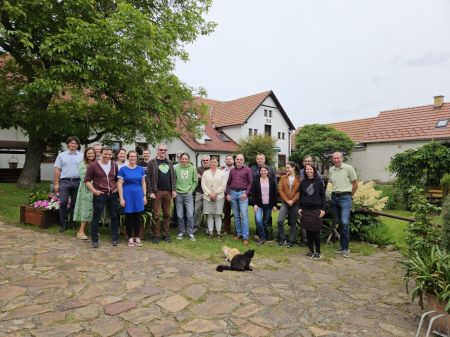 An annual meeting of the teaching staff of our department
An annual meeting of the teaching staff of our departmentLast Friday, June 14, 2024, a meeting of the Department of Chemical Engineering was held at the Inn Selský dvůr in Biskoupky near Zbiroh. The meeting was attended by educators from our department and the whole day was dedicated to key topics and the future direction of our institute.
Discussions included an inventory of tasks from the last retreat, updates on pedagogy involving undergraduate, CHI-II and new Masters students. The vision of teaching the common core at VŠCHT Prague and what may lie ahead for the Department of Chemical Engineering was discussed. We also analyzed the flow of students between degree programs and examined whether students are inspired or discouraged.
Other topics included the development and implementation of "Sustainability" in the NANO Bachelor's programme, the syllabus of the Master's programme with continuities, duplications, current status and future outlook, and the teaching in the English degree programmes.
Also discussed were building a reputation as a good "graduate school" in chemical engineering, the position of our department within the faculty highlighting strengths and weaknesses of our activities, and preparation for external evaluation of the scientific quality of the Institute's academic staff. Last but not least, we addressed the challenges for chemical engineering.
The official part of the programme was followed by leisure activities, including a trip to the lookout tower, and the day ended with a dinner together.
We thank all participants for their active participation and fruitful discussions.
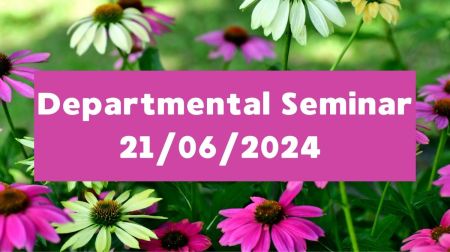 Invitation
InvitationDear friends,
our last departmental seminar of this academic year will be held next Friday, 21 June at 11:00 am in the room B028.
For this occasion we will have a special guest, Prof. Yu Lei from University of Alabama, Huntsville, who will give a lecture on Synthesis of Well-Defined Heterogeneous Catalysts using Atomic Layer Deposition. Abstract of the talk as well as short CV of Prof. Lei are attached to this e-mail. More information about research of Prof. Lei can be found here: http://leilab.uah.edu/
With best regards,
Sasha Zubov
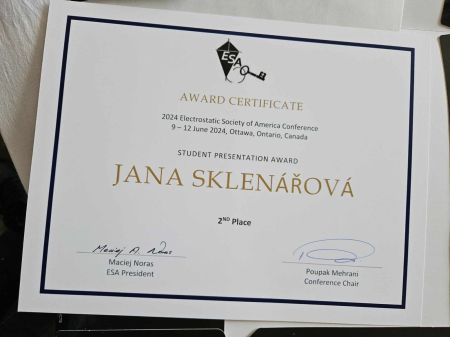 Awards at ESA Annual Meeting
Awards at ESA Annual MeetingAt 2024 Annual Meeting of the Electrostatics Society of America (ESA) in Ottawa, Canada, our PhD students received two prestigious awards. Jana Sklenářová placed 2nd in the competition for student presentation award with her contribution entitled “Experimental description of polyolefin particle morphology and its use in quantitative comparison of charging of differently produced samples”, while Jiří Perner placed 3rd in the competition for best poster award with his contribution “DEM model for triboelectrification of rough particles”.
Big congratulations to these talented young scientists!
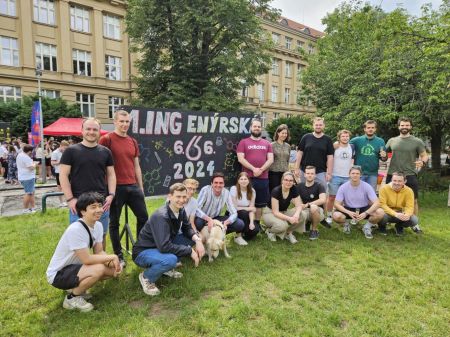 Congratulations to the new engineers
Congratulations to the new engineersThe first engineering party is already a traditional barbecue garden party at UCT Prague for fresh engineers. Yesterday, a large group of them included graduates from our department, who on Monday or Tuesday successfully defended their diploma theses and passed the state final exams. Congratulations!
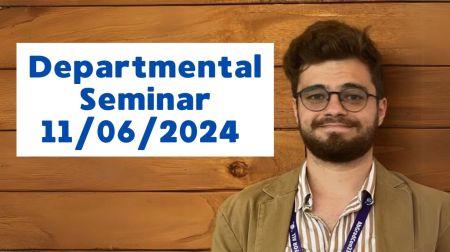 Invitation
InvitationTuesday June 11, 2024, 11:00 room B028
Tym Sokolskyi: "Evolutionary dynamics of prebiotic chemical systems"
PhD Candidate in Astrobiology & Evolution, Wisconsin Institutes for Discovery, University of Wisconsin-Madison
Website: www.tymsokolskyi.com
Life is most often defined as a self-sustaining chemical system capable of adaptive evolution. The origin of adaptive evolution is, therefore, fundamental to origins of life, as any system capable of it can start rapidly increasing in complexity eventually leading to extant biology. So, could non-biological chemistries evolve? Theoretical research suggests the possibility of compositional inheritance in some chemical systems, which is based on the relative abundances of their component molecules. Using an experimental framework of recursive transfers-with-dilution I am searching for heritability and evolvability in two types of systems: particles composed of short-chain amphiphiles and small-molecule chemical systems. In the experiments with amphiphilic particles, we observe irregular changes in various properties, including fluorescence of Nile Red dye, with a tendency for parent and offspring samples to have correlated values, suggestive of heritability. This last result, combined with evidence of temporal autocorrelation across generations, suggests the possibility that vesicles could respond to selection. Additionally, in experiments using a mixture of several organic and inorganic compounds with pyrite mineral we also detect evidence of heritability of chemical composition, however only in a relatively small set of compounds. Overall, in this talk I will outline our approach to experimentally quantifying chemical evolution and will show that it can be applied to various systems.
Organized by Jitka Čejková and Sasha Zubov
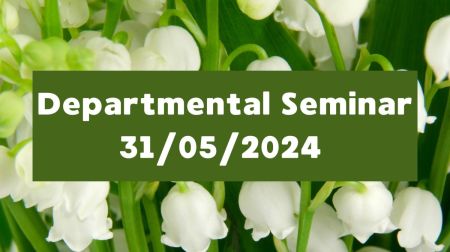 Invitation
InvitationDear friends,
our next departmental seminar will be held this Friday, 31 May at 11:00 am in the room B028. We can look forward to the following three talks:
1. Sreela Ramesh: Salts of antipsychotic drug cyamemazine: crystallization, structural features and pharmaceutical implications
2. David Tichý: Microfluidic preconcentration and separation of charged analytes
3. Jakub Strnad: Overlimiting phenomena in electrodialysis
You are all cordially invited to join us, listen and discuss the research of our guests. Again, snacks will be served, as well as tea and coffee, so do not forget to bring your mugs, too!
With best regards,
Sasha Zubov
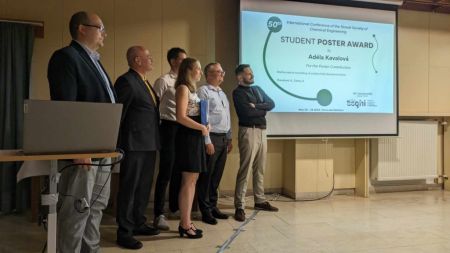 Best Poster Award at SSCHE Conference
Best Poster Award at SSCHE ConferenceThis week, three dozen students and their supervisors took part in the 50th jubilee international conference of the Slovak Society of Chemical Engineering (SSCHE) in the High Tatras. This very pleasant experience was enriched during the last evening of the conference, when the organizers announced that the prize for the best poster in the amount of EUR 250 was won by talented master's student Adéla Kavalová from the group of Sasha Zubov for her poster entitled "Mathematical modeling of poly(lactide) depolymerization". Congratulations!
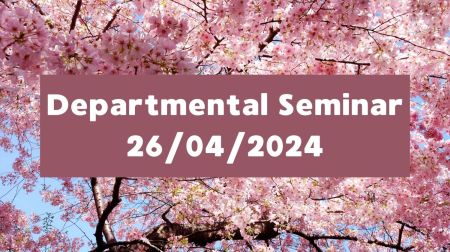 Invitation
InvitationDear friends,
our next departmental seminar will be held next Friday, 26 April at 11:00 am in the room B028. On the program we have the following two talks:
1. David Zůza: Device for simultaneous dissolution and permeation measurement
2. Ondřej Šrom: Study of hydrodynamic stress in cell culture bioreactors via lattice-Boltzmann CFD simulations supported by micro-probe shear stress method
You are all cordially invited to join us, listen and discuss the research of our guests. Again, snacks will be served, as well as tea and coffee, so do not forget to bring your mugs, too!
With best regards,
Sasha Zubov
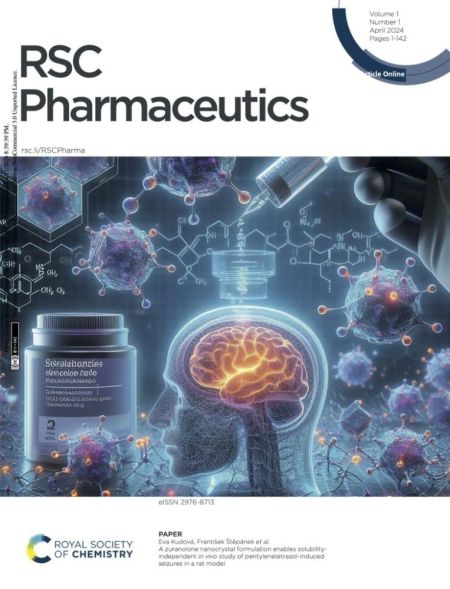 Front cover of RSC Pharmaceutics
Front cover of RSC PharmaceuticsWe are thrilled to announce that an article by a Chobotix team member Stanislav Chvíla has been selected for the front cover of the very first issue of a new journal RSC Pharmaceutics, published by the Royal Society of Chemistry. The work titled “A zuranolone nanocrystal formulation enables solubility-independent in vivo study of pentylenetetrazol-induced seizures in a rat model“, which is the result of a long-standing collaboration with the neurosteroids research group of Dr Eva Kudová from IOCB, reports on a novel approach to conducting in vivo studies with poorly soluble drugs, using nanosuspensions stabilised by phospholipids instead of solubilisation techniques that rely on DMSO or cyclodextrins. Keeping pace with current trends, the cover page graphics was created with the help of generative AI.
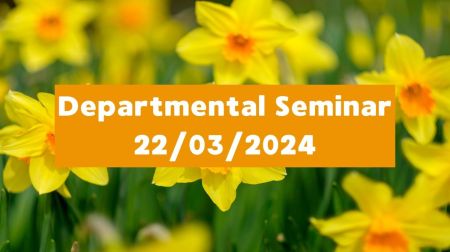 Invitation
InvitationDear friends,
our next departmental seminar will be held this Friday, 22 March at 11:00 am in the room B028. On the program we have two following talks:
1. Jiří Perner: Automatic detection of meliorations using machine learning
2. Aleš Palkovič: CFD fire simulations
You are all cordially invited to join us, listen and discuss the research of our guests. Again, snacks will be served, as well as tea and coffee, so do not forget to bring your mugs, too!
With best regards,
Sasha Zubov
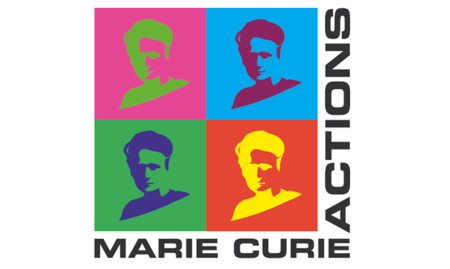 MSCA Postdoctoral Fellowship
MSCA Postdoctoral FellowshipUCT Prague successful in the prestigeous MSCA Postdoctoral Fellowship call
Two new holders of the prestigious EU-funded Marie Skłodowska-Curie Actions Postdoctoral Fellowship (MSCA PF) will join UCT Prague. These grants enable talented postdocs to implement their own excellent research project and boost their career development.
Dr. Emilia Jakubowska from Poznań University of Medical Sciences received an exceptional 100% evaluation score for her project "Advanced manufacturing of drug substances by co-processing with excipients through heteronucleation in a milifluidic device (ManCoProc)". Supervised by prof. František Štěpánek, the fellowship will be implemented at the Department of Chemical Engineering during 19 months, incl. 3 months of "non-academic placement" at Zentiva.
Dr. Yirong Zhao succeeded with her two-year project "Developing high-energy tellurium/selenium redox-amphoteric conversion cathode chemistry for aqueous aluminum batteries (TSRA)". After completing her current postdoc at the Technische Universität Dresden, she will join the group of prof. Zdeněk Sofer at the Department of Inorganic Chemistry.
Another 14 projects achieved sufficient evaluation score to obtain synergic funding from the OP JAK programme, for which the Project Center is preparing a joint application (joint project Chemfells VII). In total, 16 of the 25 submitted proposals are thus eligible for funding from one of the available sources, same as in the 2022 call.
UCT Prague thus confirmed the success of previous years and once again ranked among the most successful Czech institutions. Out of the total number of 8039 submitted projects, 1249 will be funded, 12 of them to the Czech Republic institutions. Currently, 5 MSCA PF projects are implemented at UCT Prague (incl. 2 from a specific call for Ukrainian researchers) and 11 MSCA PF projects financed by OP JAK (Chemfells V and VI projects).
 Invitation
InvitationDear friends,
our next departmental seminar will be held next Friday, 23 February at 11:00 am in the room B028 and we can look forward to the following talks:
1. Jan Němec: Effective modeling of transport limitation and filtration in catalytic filters
2. Filip Zavřel: Continuous antisolvent precipitation and spray drying as a new formulation platform for poorly soluble drugs
You are all cordially invited to join us, listen and discuss the research of our guests. Again, snacks will be served, as well as tea and coffee, so do not forget to bring your mugs, too!
With best regards,
Sasha Zubov
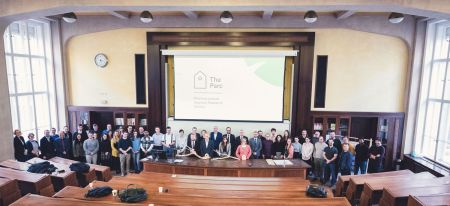 The Parc Awards
The Parc Awards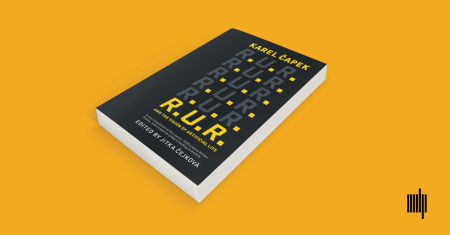 R.U.R. and the Vision of Artificial LifeThe book edited by Jitka Čejková published by MIT Press
R.U.R. and the Vision of Artificial LifeThe book edited by Jitka Čejková published by MIT Press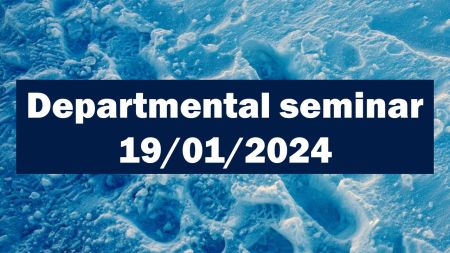 Invitation
InvitationDear friends,
our next departmental seminar will be held next Friday, 19 January at 11:00 am in the room B028 and we can look forward to the following talks:
1. Ondřej Navrátil: Fluid bed coating in pharmaceutical industry
2. Martin Bureš: Carbon felt electrodes in redox flow batteries: overview, mathematical modelling and micro-computed tomography
You are all cordially invited to join us, listen and discuss the research of our guests. Again, snacks will be served, as well as tea and coffee, so do not forget to bring your mugs, too!
With best regards,
Sasha Zubov
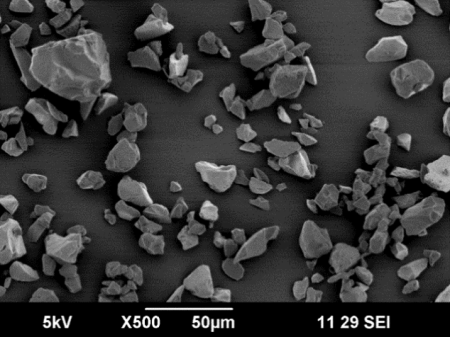 New patent
New patentA new patent titled “Method of producing mesoporous SiO2 particles, mesoporous SiO2 particles and use thereof“, authored by David Zůza, Marek Šoltys and František Štěpánek, has just been fully granted by the Czech Intellectual Property Office under patent no. 309925. Mesoporous silica particles have diverse applications including drug formulation and drug delivery. Our patent covers a novel method for a continuous, emulsion-free manufacturing process that yields mesoporous silica particles with superior properties compared to commercially available materials and is easily scalable from laboratory to industrial production. The patent is the result of our long-term commitment to both basic and applied research in the field of mesoporous materials and their chemical engineering applications.
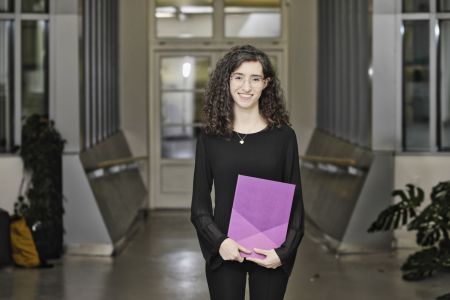 Suada Djukaj awarded by the 2024 Martina Roeselová Memorial Fellowship grantCongratulations!
Suada Djukaj awarded by the 2024 Martina Roeselová Memorial Fellowship grantCongratulations!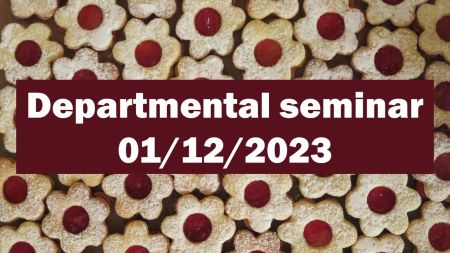 Invitation
Invitation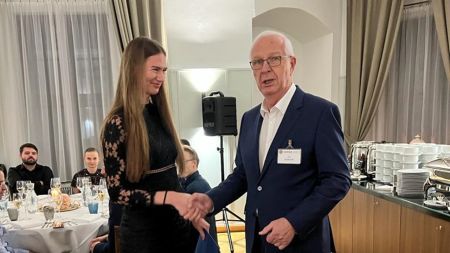 CHISA 2023 Conference
CHISA 2023 ConferenceFrom November 6 to 9, 2023, the traditional CHISA chemical-engineering conference took place in the Conference Center of the Academy of Sciences of the Czech Republic at the castle in Třešť. The program offered interesting plenary and student lectures and poster presentations. In the competition for the best student contribution, third place went to Laura Bábanová from our faculty, who developed her work as part of an Erasmus stay at the Istituto per la Tecnologia delle Membrane (Consiglio Nazionale delle Ricerche) in Italy. She is a student at the Department of Chemical Engineering and is now working on her diploma thesis under the supervision of doc. Jitka Čejková and Prof. Karel Friess. Her work dealt with functionalized polymer membranes for pesticide degradation. Congratulations and thank you for representing our university at this year's prestigious CHISA 2023 conference.


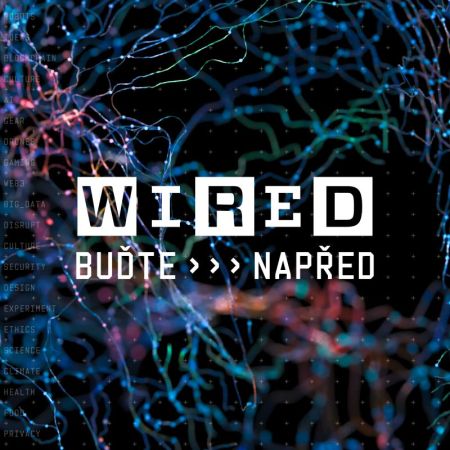 The cult Wired magazine has arrived in the Czech Republic
The cult Wired magazine has arrived in the Czech Republic The cult Wired magazine has arrived in the Czech Republic and we are proud that an article about our research on remotely controlled antibiotic depot systems has been published in its first issue.
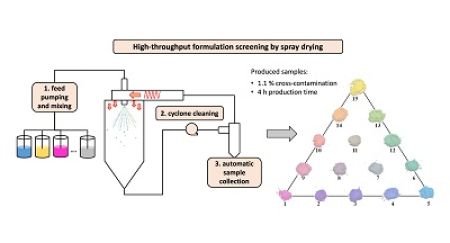 Automating Pharmaceutical Spray Drying for Accelerated Drug Development
Automating Pharmaceutical Spray Drying for Accelerated Drug Development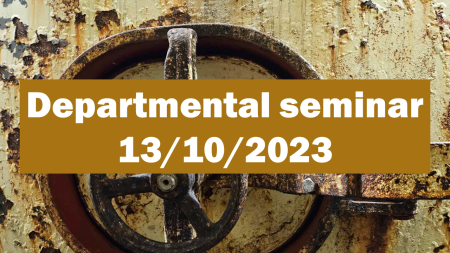 Invitation
InvitationDear friends,
I would like to invite you to our fist proper departmental seminar of this academic year. The seminar will be held next Friday, 13 October at 11:00 am in the room B028 and we can look forward to the following talks in which we will go from the fundamental science of electrostatic charging to the applications in plastic waste recycling:
1. Jarmila Pelcová: Electrostatic charging of powders: Theory and modelling
2. Jana Sklenářová: Electrostatic charging of powders: Experimental approach and application
3. Jakub Klimošek: Plastic waste upgrade by solvent-based recycling methods
You are all cordially invited to join us, listen and discuss the research of our guests. Again, snacks will be served, as well as tea and coffee, so do not forget to bring your mugs, too!
With best regards,
Sasha Zubov
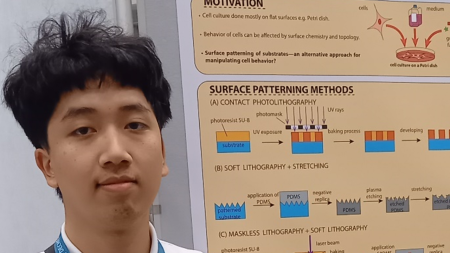 ECCE 2023 Berlin Best Poster Award
ECCE 2023 Berlin Best Poster AwardStudent Viet Tomáš Nguyen from the Laboratory of Biomimetic Engineering won the prize for the best poster entitled "Surface patterning methodology for cell culture" at the ECCE 2023 (14th European Congress of Chemical Engineering) conference in Berlin, Germany. Congratulations!
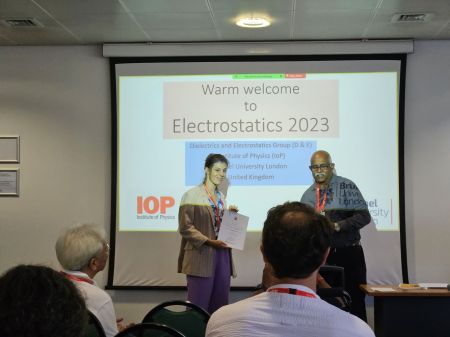 The success of Kosek Group students
The success of Kosek Group studentsFrom 4 to 8 September, our PhD students participated at two prestigious international conferences, where they received awards for their posters dealing with recycling and processing of plastic waste.
Jana Sklenářová obtained Poster Award for her contribution “Sorting of Plastic Waste Using Triboelectrification and Subsequent Electric Field Separation” at the Electrostatics 2023 conference in London, UK. Jakub Klimošek received award for his poster on “Recycling and Upgrading of Plastics by Solvent-Based Methods” at the 14th International Workshop on Polymer Reaction Engineering in Potsdam, Germany.
Big congratulations to both!
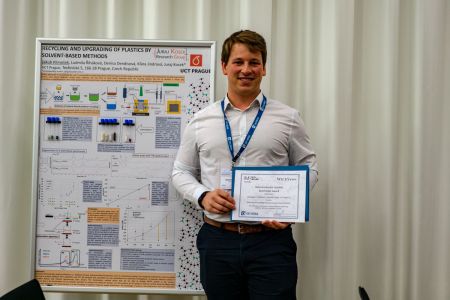
 Our student Martin Roudný
Our student Martin RoudnýMany congratulations to our MSc student Martin Roudný, who won the 2023 national academic championships in orienteering in both the Middle distance (6000 m) and in Sprint (3600 m). The championships took place in Olomouc as part of the 2023 Czech Academic Games and Martin won from a field of more than 50 competitors. Many congratulations for this outstanding achievement, and huge respect for being able to combine top-level athletic performance with Chemical Engineering studies!
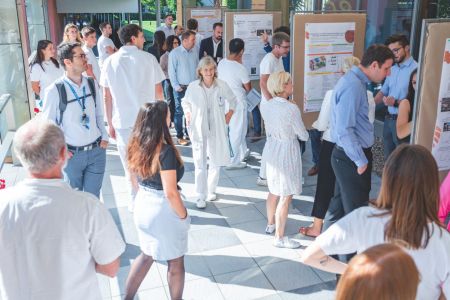 Zentiva Science Day
Zentiva Science DayA strong representation of PhD students from the Chobotix group participated at a Science Day in Zentiva, a Czech pharmaceutical company and the main industrial collaborator and partner within the consortium The Parc, in which VŠCHT Prague is also involved. The event was started by the head of our department, prof. František Štěpánek, who is the scientific director of The Parc, Dr. Ondřej Dammer, executive director of The Parc, Dr. Martin Albert, Chief Scientific Officer of Zentiva, and Dr. Steffen Saltofte, CEO of Zentiva. We thank all presenters for sharing their work with a wider audience and for enthusiastically discussing their research projects not only with technical specialists from R&D and manufacturing, but also with colleagues from other sectors of society.
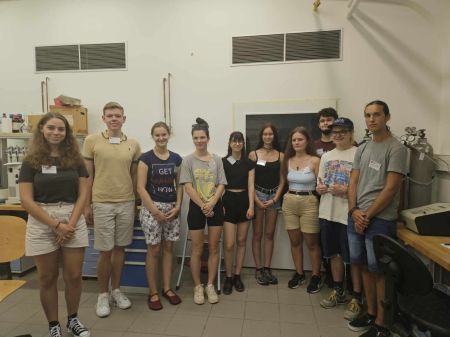 Summer school for high school teachers and students
Summer school for high school teachers and studentsThe 37th edition of the summer school for high school teachers and students started today at the University of Chemistry and Technology Prague. Jitka Čejková first lectured at this event in 2006 and since then she has been involved regularly, especially as a lecturer in laboratory exercises for students and teachers. This year, together with PhD students Liza Mutylo and Verča Lesáková, they prepared a programme called "Chemical Engineering for Beginners and Intermediate". 10 students visited the chemical engineering laboratories today, where they learned about various unit operations and apparatuses, and then the "nano micro" laboratories, where students prepared (and then took home in a cup) a cream as part of the Emulsion laboratory task. The summer school runs until Thursday.
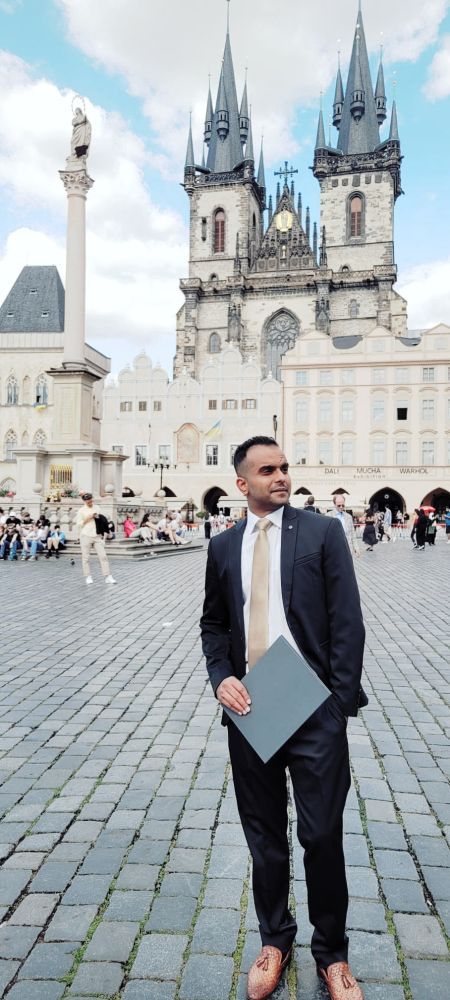 Shaheryar Muhammad, the first graduate of our Master's English program
Shaheryar Muhammad, the first graduate of our Master's English programMy experience at University of Chemistry and Technology, Prague has been a rollercoaster ride of growth, opportunities and challenges. The campus is vibrant and diverse, with students from all over the world. On my first day, I was welcomed with open arms by both staff and fellow students. The first few days were overwhelming as I tried to juggle classes, social events and extracurricular activities. However, I quickly found my footing and embraced the university experience.
Living in the residence halls was the best decision I made. Having the freedom to explore and socialize with my peers was invaluable. Also, the cost of living at dorms and tuition fee are both affordable.
The academic demands were initially daunting, but with the help of my professors and teaching assistants, I quickly got up to speed as my professors were knowledgeable and passionate about their subjects. The lectures were stimulating, and the curriculum was rigorous but relevant. I never felt bored because the academic projects were based on real industrial problems. I had the opportunity to attend seminars specially designed to learn new chemical engineering software. The syllabus was challenging but manageable as long as I kept up with my readings and attended classes regularly.
As my university experience progressed, I realized that the knowledge I was gaining wasn't only in the lecture hall. It was also being acquired through the consultations I had with my professors, the challenges I faced while juggling a busy schedule, and the skills I learned while working on various chemical engineering projects. I gradually saw myself growing and learning things that would have been unimaginable just a few years ago. As a result I was awarded with the 'university scholarship- excellent study results'.
The university provided me with ample opportunities, and I seized them, which ultimately helped me acquire new skills, form new relationships, and broaden my horizons. Perhaps the most significant accomplishment was that before graduation I was able to secure a full-time job in one of the reputable company in Czechia.
In conclusion, my university experience was more than just a period of study; it was a life-changing journey that prepared me for the future. The knowledge, skills, and experiences that I acquired during my time there continue to benefit me in my personal and professional life. University of Chemistry and Technology, Prague has been both a challenging and rewarding experience, shaping me into a well-rounded and informed individual ready to take on the world.
Overall, the University was much more than an academic institution. It was a community, a home away from home, and a launchpad for my future. I would recommend anyone to give it a try and discover what awaits them at the university.
Shaheryar Muhammad, August 2023
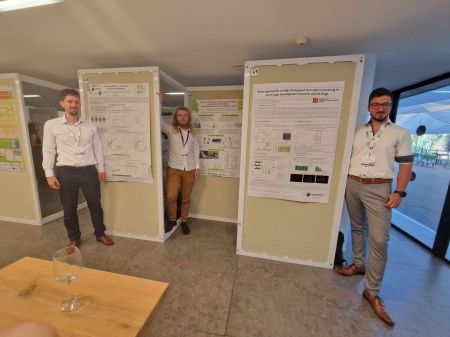 Prague – Weizmann Summer School in Drug Discovery and Development
Prague – Weizmann Summer School in Drug Discovery and DevelopmentFrom 30 July to 3 August, Israeli and Czech scientists and representatives of the global pharmaceutical industry jointly discussed new developments in drug development at the traditional Prague - Weizmann Summer School in Drug Discovery and Development. Students from various countries, including the Czech Republic, watched inspiring lectures in Rehovot, Israel, and learned about the details of the development of new drugs, from basic research to introduction into clinical practice.
Most of them were PhD and postdoctoral students, recruited this year from a total of 26 countries. The lectures were provided in equal parts by the IOCHB, VŠCHT Prague and in the last five years also by the prestigious scientific institution from Israel, the Weizmann Institute of Science. In addition to the capacities from the academic sphere, there were traditionally also employees of large pharmaceutical companies. This year, for example, Pfizer, AbbVie, NeuroDerm, Solgate or Anima Biotech participated.
The aim was to better prepare students for the pitfalls that come with developing new drugs. Whether they encounter difficulties at the beginning of their journey, i.e. in the laboratories of scientific institutions, while trying to obtain the necessary financial resources or while building collaborations with pharmaceutical companies. In practice, there is a lot of competition and only a fraction of promising molecules have a chance to succeed. An important factor in this is how well the system for transferring the results of scientific research into practice is set up, i.e. technology transfer.
Our Department of Chemical Engineering was represented at this event by three students (Martin Balouch, Stanislav Chvíla and Filip Hládek) and also by Professor František Štěpánek. While the speakers dealt mainly with drug discovery and development, our representatives gave presentations focused on the formulation of poorly soluble drugs.
Photo: The Parc
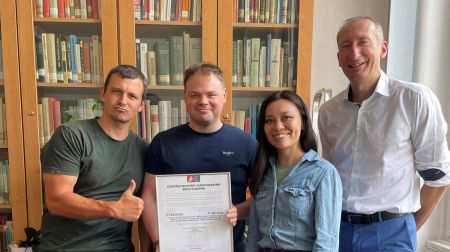 European patent
European patent Congratulations to the team of Vojtěch Klimša, Gabriela Ruphuy Chan, Ondřej Kašpar and František Štěpánek for the European patent entitled:: DEVICE FOR CONTINUOUS SPRAY DRYING WITH VARIABLE INLET COMPOSITION, METHOD FOR CONTINUOUS PRODUCTION OF MULTI-COMPONENT POWDERS BY SPRAY DRYING AND USE.
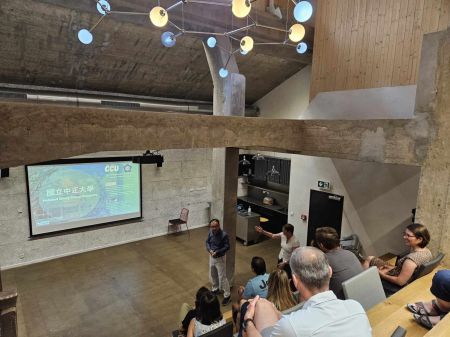 Prof. Chien-Yen Chen from National Chung Cheng University
Prof. Chien-Yen Chen from National Chung Cheng UniversityProf. Chien-Yen Chen from National Chung Cheng University (Taiwan) gave a lecture on biosurfactants today in Uhelna from 2 pm as part of his visit to our department.
Title: A unique biosurfactant Surfactin, its properties and application
The application of a high throughput analysis method for the screening of potential biosurfactants from natural sources has been developed. The method described here is based on the effect of meniscus shape on the image of a grid viewed through the wells of a 96-well plate. Methods of producing the lipopeptide biosurfactant, surfactin, from cultures of Bacillus subtilis (BBK006) have been investigated. A reactor with integrated foam fractionation was designed and used in batch and continuous modes. Neutron reflectometry has been used to study the structure of the biosurfactant, surfactin, at the air/water and at the hydrophobic solid/water interfaces. The study of photoluminescence of single-walled carbon nanotubes wrapped with surfactin was carried out. Synthesis of silver and gold nanoparticles using a borohydrate reduction was performed at three pH levels and two different temperatures in the presence of surfactin that was used to stabilize the formation of silver and god nanoparticles. Synthesis of brushite particles in reverse microemulsions of the biosurfactant surfactin was investigated. A novel BMSN (biologically synthesized mesoporoussilica nanoparticles) material was prepared using abacteria-mediated biosurfactant. Removal of fluoride from water was stydied using the bacterial surfactin mediated novel hydroxyapatite nanoparticle. Low-temperature synthesis of rose-like ZnO nanostructures was sunthesized using surfactin and their photocatalytic activity has been checked. Removal of mercury by foam fractionation was also carried our using surfactin, a biosurfactant. This report describes the use of a renewable, environmentally compatible, biodegradable surfactant as a stabilizing agent for the synthesis of nanoparticles and their application for evrinmenal issues.
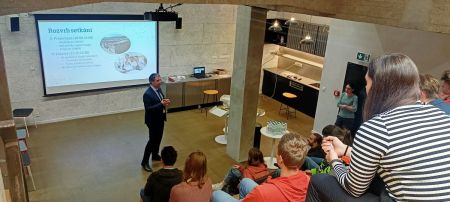 Welcome to Students
Welcome to StudentsOn Friday, June 2nd, and yesterday, we had the pleasure of welcoming students to our Department of Chemical Engineering who are planning to start their bachelor's studies in September. Specifically, these were students of the Nano and Microtechnology in Chemical Engineering and Chemical Engineering and Bioengineering study programs at the Faculty of Chemical Engineering. This event was organized with the aim of introducing new students to studying with us and familiarizing them with the atmosphere of our faculty. The program began with a warm welcome from the dean, followed by a meeting with field experts and tutors who presented them with study plans and available courses. As part of the program, the students had the opportunity to visit laboratories that are essential for studying nano and microtechnologies, as well as chemical and bioengineering. During the tours, they were shown modern equipment and technologies available at our department. This allowed the students to become acquainted with the environment in which they will spend the next three years of their studies, and perhaps longer if they decide to continue with a master's degree. We look forward to the arrival of new students and believe that their study experience at our faculty will be full of new knowledge, a friendly atmosphere, and achievements.
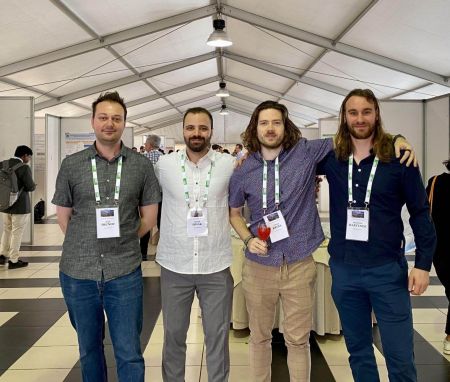 BEAMlab group
BEAMlab group The ICheap conference is organized annually by the Italian Society of Chemical Engineering, this year for the sixteenth time. This year, five of our student and staff representatives from the BEAMlab group participated in this important event, which took place from May 21 to 24, 2023 in the beautiful historic city of Naples, Italy.
We would like to thank The Italian Association of Chemical Engineering for organizing this prestigious conference where our students and staff represented their research in computational fluid dynamics, photocatalysis, CO2 capture and pharmaceutical research.
We are also glad that our students and staff represented the Department of Chemical Engineering at this conference, where they presented their talent and expertise. They thus perfectly show our effort to advance scientific knowledge in the field of chemical engineering and its connection with other disciplines. Congratulations to all participants and thank you for representing our department.
Author: Dominik Švára
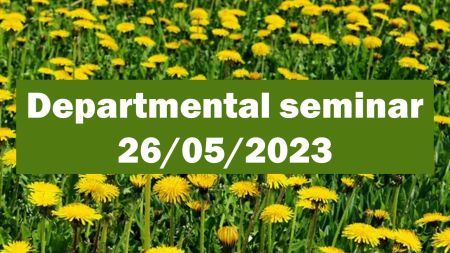 Invitation
InvitationDear friends,
I would like to invite you to our next and departmental seminar, for which we will have two special guests, Dr. Claudia Roman and Prof. Moisés García-Morales from Universidad de Huelva. The seminar will be held this Friday, 26 May at 11:00 am in the room B028 and we can look forward to the two following talks (see abstracts):
1. Phase affinity of nanoparticles in immiscible polymer blends: theoretical prediction, experimental evidences and strategies to minimize the percolation threshold
2. Case study: The selective localization of MWCNTs in PMMA/LDPE nanocomposites
You are all cordially invited to join us, listen and discuss the research of our guests. Again, snacks will be served, as well as tea and coffee, so do not forget to bring your mugs, too!
With best regards,
Sasha Zubov
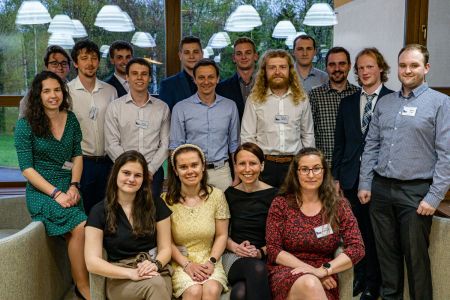 SSCHE 2023
SSCHE 2023 The Slovak Society of Chemical Engineering annually organizes the SSCHE conference, this year being its forty-ninth edition. Once again, nearly twenty representatives from our institute, including both students and employees, participated in this significant event held from May 15th to 18th, 2023, in the beautiful surroundings of the High Tatras at Hotel SOREA Hutník in Tatranské Matliare.
The presentations delivered by our representatives captivated the conference attendees, and their posters showcased a high level of expertise. We are proud to announce that Eliška Paulíková, a third-year bachelor's student, was awarded in the poster competition for her work titled "Study of Translational and Rotational Motions of Self-Propelled Liquid Robots." It is truly inspiring to witness our students and employees excelling in the field of chemical engineering, bringing innovative approaches and research to a wide range of areas.
We would like to express our gratitude to the Slovak Society of Chemical Engineering for organizing this outstanding conference and extend our thanks to the open access journals Catalysts, Energies, and Processes for their financial support of the student poster competition winners.
We take great pride in our students and employees who represented the Department of Chemical Engineering at this conference, showcasing their talents and expertise. It serves as a remarkable example of our commitment to scientific development and contributions in the field of chemical engineering. Congratulations to all participants, and thank you for representing our institute so admirably!
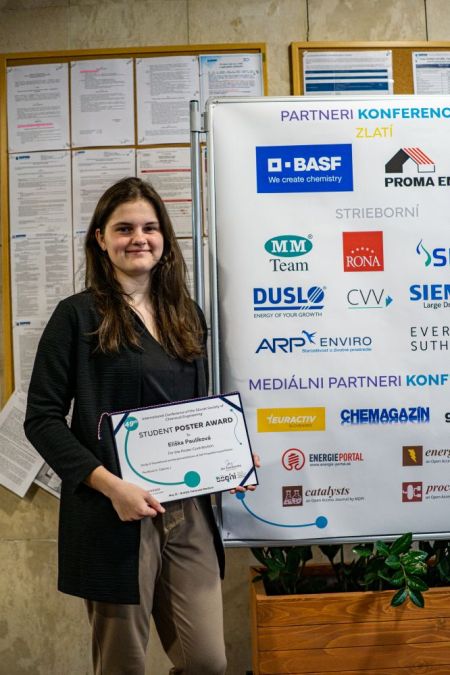
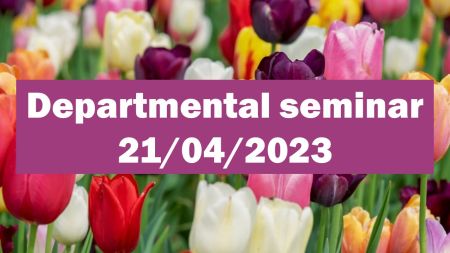 Invitation
Invitation Paper by Martin Balouch et al.
Paper by Martin Balouch et al.Recent publication titled “Computational prodrug design methodology for liposome formulability enhancement of small-molecule APIs” has been featured on the cover page of Molecular Pharmaceutics. The paper, authored by Martin Balouch and František Štěpánek in cooperation with Kateřina Storchmannová and Karel Berka from Palacký University Olomouc and kindly supported by The Parc, reports on a new computational strategy for the design of prodrugs in order to modify their permeation rate across lipid bilayers. This is important both for poorly permeating substances to improve their bioavailability, and for very rapidly permeating substances to enable their formulation into liposomes.
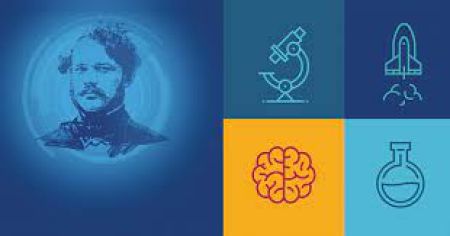 Werner von Siemens Awards 2022Diploma thesis of Dominik Martynek is the fifth best in the Czech Republic
Werner von Siemens Awards 2022Diploma thesis of Dominik Martynek is the fifth best in the Czech Republic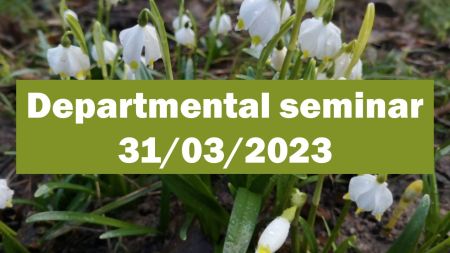 Invitation
InvitationDear friends,
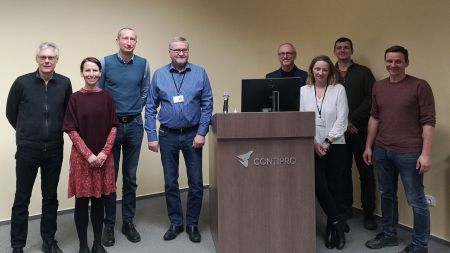 Contipro
Contipro Contipro is one of the world leaders in the production and research of hyaluronic acid for pharmaceutcal and cosmetic industries. Representatives of our department went on an excursion to the headquarters of this biotechnological company in Dolní Dobrouč to discuss possible cooperation and the possibility of involving students in research projects.
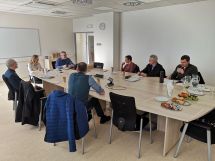
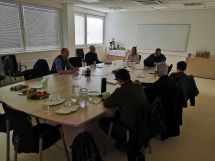
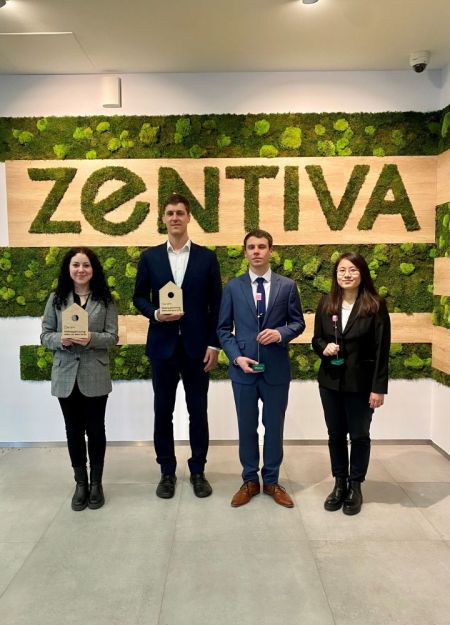 2022 The Parc Awards
2022 The Parc Awards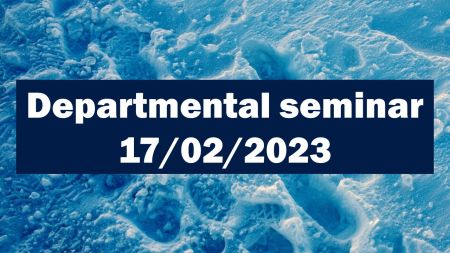 Invitation
Invitation Dear friends,
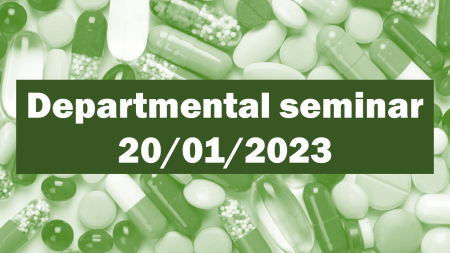 Invitation
Invitation- Lenka Krajáková: Improper behavior of ethylene polymerization
- Erik Sonntag: ROBO-PHARMACIST: Automatic Compounding Line for Continuous Manufacturing of Personalized Multi-Component Capsules
- Karel Mařík: Thermographical observation of the distillation process
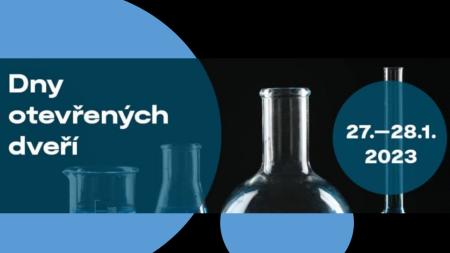 Open house daysat UCT Prague (27 and 28 January, 2023)
Open house daysat UCT Prague (27 and 28 January, 2023)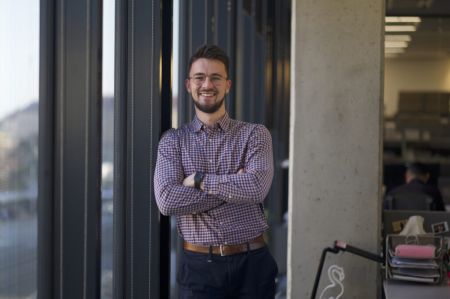 Crytur Award 2022 for Adam Balážfor the best diploma thesis
Crytur Award 2022 for Adam Balážfor the best diploma thesis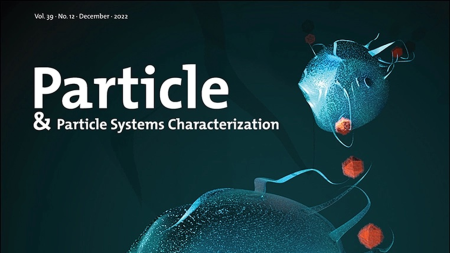 A paper by D.Lizoňová et al.
A paper by D.Lizoňová et al. In article Solvatochromic Shift Enables Intracellular Fate Determination of Curcumin Nanocrystals (Part. Part. Syst. Charact. 12/2022) Denisa Lizoňová, Adéla Brejchová, Eva Králová, Jaroslav Hanuš, František Štěpánek from our department describe a methodology based on fluorescence microscopy, where curcumin nanocrystals can be distinguished from cell-dissolved curcumin due to differences in fluorescence emission spectra. Thanks to this, the curcumin in the cells is visualized as blue (thus blue macrophage) and nanocrystals as red. This process depends on nanocrystal surface stabilization.
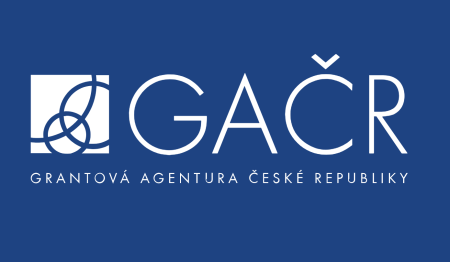 New GAČR project of Ondřej Kašpar
New GAČR project of Ondřej Kašpar25 GAČR (Czech Science Foundation) projects are heading to UCT Prague, 13 standard projects will have the main researcher from UCT Prague, and UCT is cooperating on another 12 projects. One of the supported projects will also be solved at our department. It is called "Development of inhalable carriers for in-situ production of natural antibiotics" and the principal investigator is Ing.Ondřej Kašpar, Ph.D. Congratulations!
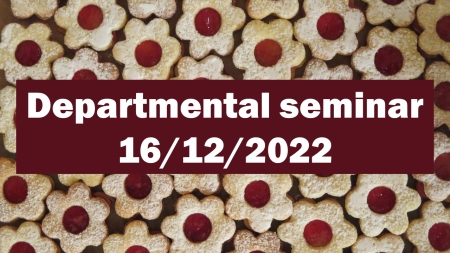 Invitation
InvitationDear friends,
I would like to invite you to our last departmental seminar of this calendar year, which will be held on Friday, 16 December at 11:00 am in the room B028, consisting of the three following talks:
1. Přemysl Richtr: Towards more efficient and stable zinc–air flow battery
2. Vojtěch Šálek: Mathematical modeling of fire spread
3. František Jonáš Rejl: Transfer characteristics of negative, neutral and positive system during distillation on structured packing
You are all cordially invited to join us, listen and discuss the research of our department. Again, snacks will be served, as well as tea and coffee, so do not forget to bring your cups, too!
With best regards,
Sasha Zubov
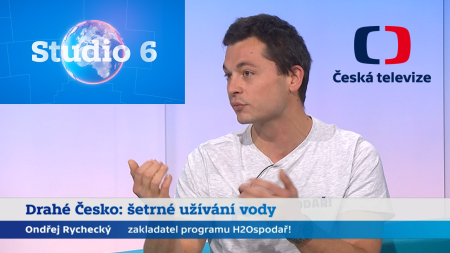 Our PhD student Ondřej Rycheckýspoke on Czech TV about saving water (2:50:35)
Our PhD student Ondřej Rycheckýspoke on Czech TV about saving water (2:50:35)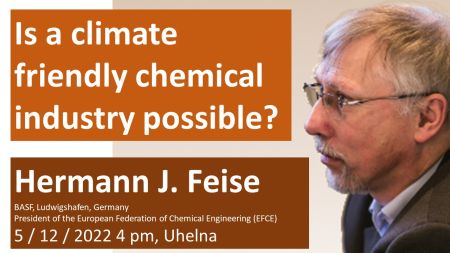 A public lecture by Dr. Hermann J. Feise from BASF
A public lecture by Dr. Hermann J. Feise from BASFDepartment of Chemical Engineering would like to invite you to a lecture by Dr. Hermann J. Feise from BASF company titled „Is a climate friendly chemical industry possible?“ which will be held on Monday, 5 December from 4 pm in Uhelna.
Is a climate friendly chemical industry possible?
|
The European Green Deal has firmly established the political intend to counteract climate change by reducing greenhouse gas emissions. Current actions focus on the energy and transportation industries. However, the producing industries will clearly become the next target areas for emission reductions. As a clear indication, the member states of the European Union have already initiated an Important Project of Common European Interest (IPCEI) on Hydrogen Technologies and Systems. This program does not only address hydrogen production and infrastructure as well as hydrogen propelled transportation, but also the use of hydrogen to transform the steel, chemical and cement industries. |
|
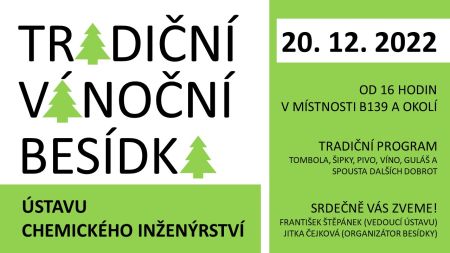 Christmas partywill take place in B139 on Tuesday, December 20, 2022
Christmas partywill take place in B139 on Tuesday, December 20, 2022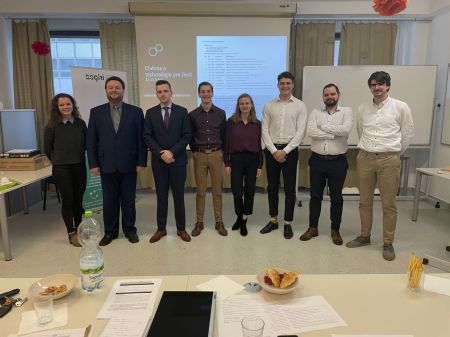 Lukáš Kamenský and Martin Spurný
Lukáš Kamenský and Martin Spurný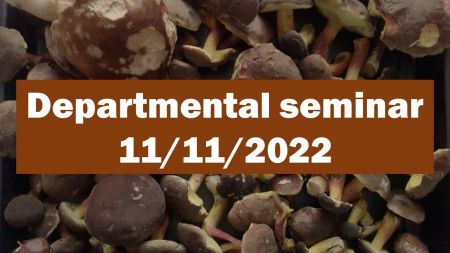 Invitation
InvitationDear friends,
please mark in your calendars that the next seminar of our department will be held on Friday, 11 November at 11:00 am in the room B028, consisting of the three following talks:
1. Lucie Mašková: Nature-based 3D bioprinted films for controlled in-situ synthesis of bactericides
2. Dominik Švára: Preparation of porous structures for drug delivery applications
3. Pavel Zelenka: CFD simulation of air-flow and cross-contamination in production space
You are all cordially invited to join us, listen and discuss the research of our department. Again, snacks will be served, as well as tea and coffee, so do not forget to bring your cups, too!
With best regards,
Sasha Zubov
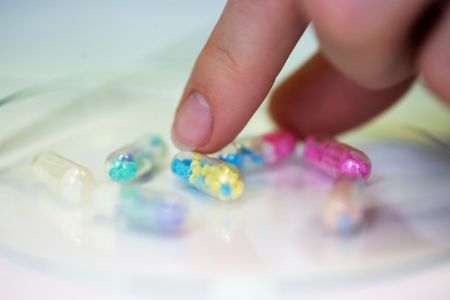 MarbleMata university spin-off founded by Ondřej Rychecký from our Department
MarbleMata university spin-off founded by Ondřej Rychecký from our Department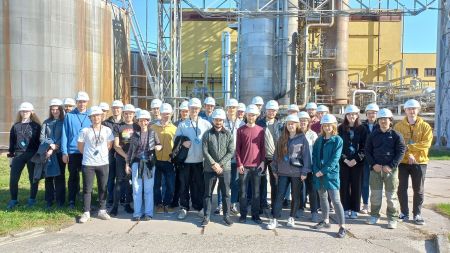 Teambuilding of master students
Teambuilding of master studentsOn October 5 - 8, 2022, the teambuilding event "Běstvina 2022" took place for students of the 1st year of the Master's degree in Chemical Engineering and Bioengineering. The event was attended by 32 students who stayed for three nights at the UCT Prague camp base in Běstvina and traveled by bus on the excursion every day. The program included a total of 6 industrial excursions (Škoda Auto, Synthesia, Kemwater ProChemie, Pardubice Brewery, wastewater treatment plant in Kutna Hora) and a block of presentations by representatives of the research groups of our department. The event was organized by Jitka Čejková.
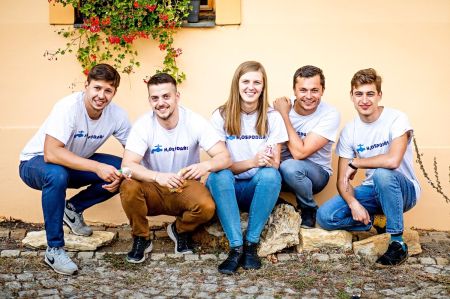 "Hello Země" Award
"Hello Země" Award Our PhD student Ondřej Rychecký and his friends founded the H2OPODAŘ association in 2017. The H2Ospodař project prepares and presents activities in the field of water management for schools, the public and institutions. The original goal of the project was to create an interactive traveling exhibition about the cycle of drinking water and better water management in households and in nature. Several dozen events take part in this exhibition every year. They also regularly visit primary and secondary schools and are striving to become an information and educational platform focused on the careful handling of water.
Now H2Ospodař has scored in the program Hello Země! The six-month journey to the gala evening was challenging. Of all the applications for this year's SDGs Awards 2022, first Hello bank! selected 15 projects that would deserve their financial support. Bank employees then sent 10 of them to the final, where their clients already decided. From the festive evening in the beautiful premises of the National Museum, the H2Ospodař delegation, accompanied by little droplet Jarmilka, received with great joy a check for 2nd place worth 300,000 CZK! This H2Ospodař activity award is greatly appreciated by the team members, largely because it was ordinary people from Hello bank!'s clientele who had the decisive say. It means that the activity of H2Ospodař is important.
Many congratulations to the awardees and many thanks for their activities and education on how to save water.
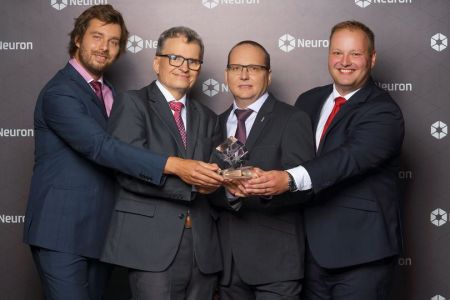 The Neuron Award for connecting science and business
The Neuron Award for connecting science and business The Scientific and Management Board of the Neuron Endowment Fund awarded the best implementation of basic research into practice. The Neuron Award for connecting science and business was awarded to Pinflow energy storage (Juraj Kosek, Jiří Vrána, Petr Mazur a Jaromír Pocedič), a company specialising in the storage of energy in redox flow batteries.
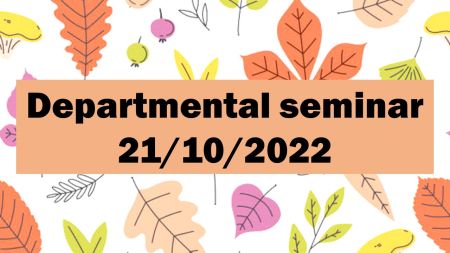 Invitation
Invitation Dear friends,
please mark in your calendars that next seminar of our department will be held on Friday, 21 October at 11:00 am in the room B028 (ex-classroom B03 in the ground floor next to the Respirium), consisting of the three following talks:
- Simon Jantač: Electrostatic charging of powders: A perplexing multiphysics phenomenon
- Martin Bureš: From homogeneous to “colloidal” olefin polymerization catalysts: effect of mass transport limitations on reaction kinetics and polymer microstructure
- Elizaveta Mutylo: Multiple-Unit Dosage System: a flexible tool for combination therapy
You are all cordially invited to join us, listen and discuss the research of our department. Again, snacks will be served, as well as tea and coffee, so do not forget to bring your cups too!
With best regards,
Sasha Zubov
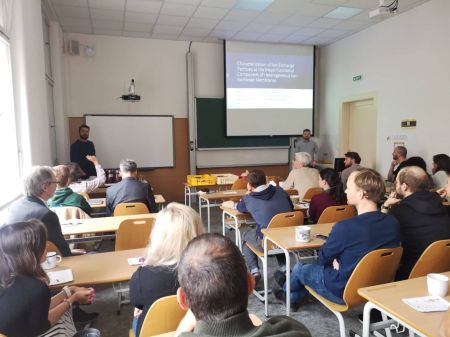 Renewed departmental seminar
Renewed departmental seminarThe first renewed seminar of our department took place on Friday, 30 September at 11:00 am in room B028 (ex-classroom B03 in the ground floor next to the Respirium).
Three talks of our PhD students were presented:
- Marie Plachá: Pore-scale modelling of soot deposits and their impact on catalytic filter performance
- Petr Polezhaev: Characterization of ion-exchange particles as the major functional component of heterogeneous ion-exchange particles
- Charlie Maslen: Hydrogel microrobots
Organized by Sasha Zubov
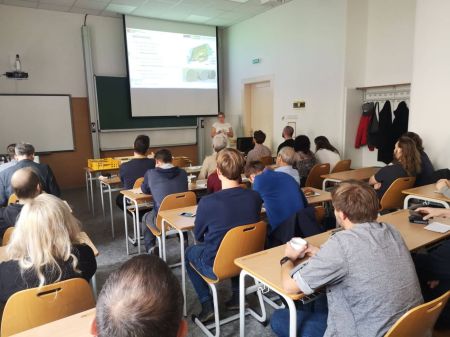
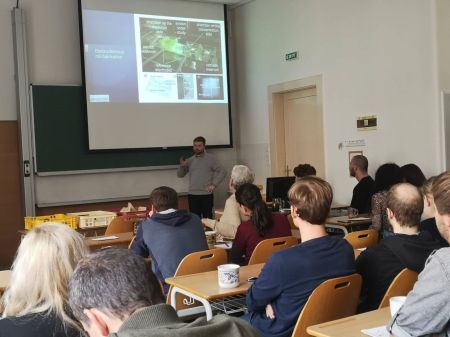
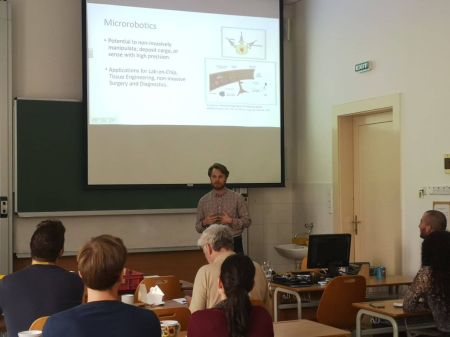
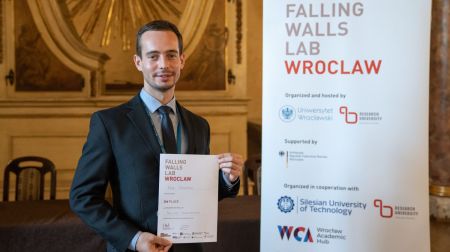 Falling Walls in Wroclaw
Falling Walls in WroclawOratorium Marianum hall of the University of Wroclaw hosted the competition Falling Walls on Monday 26 September, 2022. The participants pitched their innovative ideas in just three minutes, showcasing a breakthrough that creates a positive impact on science and society. Our student Erik Sonntag presented "BREAKING THE WALL OF MEDICAL NON-COMPLIANCE" and took the 3rd place. Congratulations!
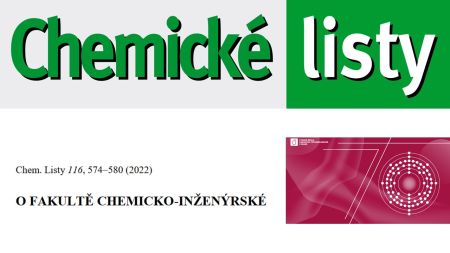 UCT Prague will celebrate its anniversary
UCT Prague will celebrate its anniversaryThe University of Chemistry and Technology Prague celebrates its 70th anniversary this year. On this occasion, a paper (in Czech) by Jitka Čejková devoted to the Faculty of Chemical Engineering was prepared. First, the history of the faculty and the development of its departments is summarized. The faculty was established as the Faculty of Chemical Production, Automation and Economics in 1960 and it was renamed to the Faculty of Chemical Engineering in 1969. Further, the key scientists, teachers and deans are introduced and their contribution to the advancement of the faculty highlighted. The current offer of study programs (bachelor, master and doctoral) in both Czech and English is also listed.
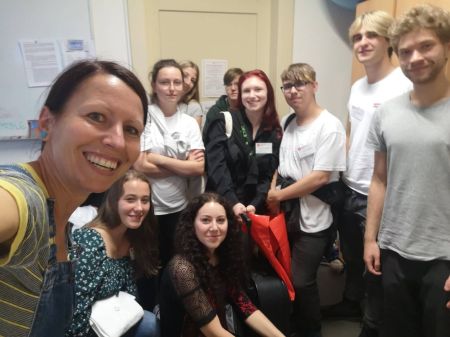 Summer school for high school teachers and studentsOur department was traditionally involved as well
Summer school for high school teachers and studentsOur department was traditionally involved as well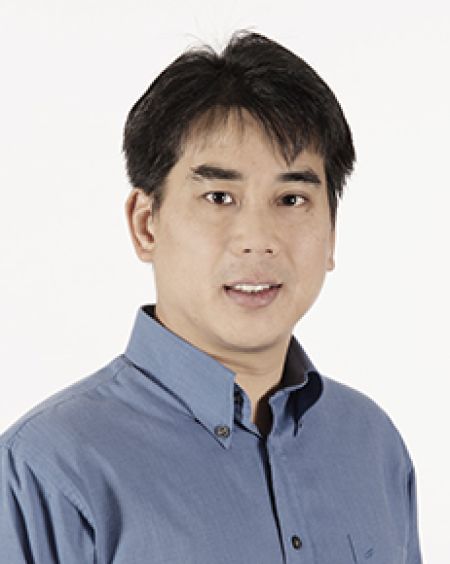 Invitation to the lectureLeslie Yeo, 26. 8., 11 am, lecture hall BIII
Invitation to the lectureLeslie Yeo, 26. 8., 11 am, lecture hall BIII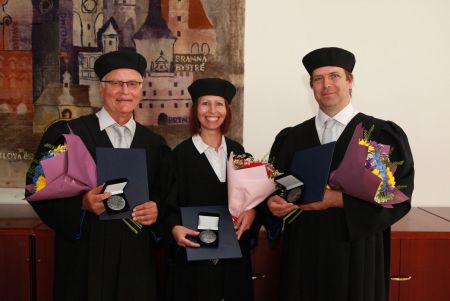 Medal of the Faculty of Chemical Engineering
Medal of the Faculty of Chemical EngineeringMaster's graduations took place on Wednesday, June 22, 2022. At the same time, the Betlemská Chapel hosted a ceremonial award with the medals of the Faculty of Chemical Engineering of three outstanding personalities who, with their scientific, pedagogical or organizational activities, contributed to the development of our faculty. Dean of the faculty prof. Michal Přibyl handed over the medal personally to doc. Pavel Chuchvalec from the Department of Physical Chemistry, doc. Jitka Čejková from the Department of Chemical Engineering and doc. Vladimír Scholtz from the Department of Physics and Measurement Technology.
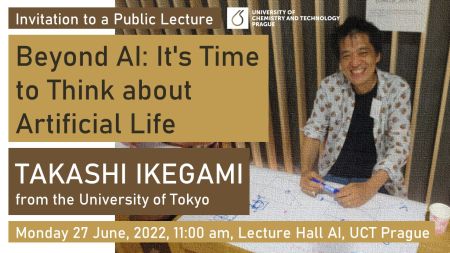 Invitation to a public lectureOur Department hosts Takashi Ikegami from the University of Tokyo
Invitation to a public lectureOur Department hosts Takashi Ikegami from the University of Tokyo Teambuilding 2022
Teambuilding 2022Teachers from our department spent two half days out of Prague to intensively discuss about topics related to education and research at our Department of Chemical Engineering.
 Best poster awards
Best poster awardsThe linked conference SSCHE 2022 and PERMEA 2022 was organized by the Slovak Society of Chemical Engineering with assistance of the Institute of Chemical and Biochemical Engineering of the Slovak University of Technology. The conference took place in Tatranské Matliare on 23 - 26 May, 2022. There was a poster competition and the winner was our PhD student Pavel Krýsa from the group of Miro Šoóš. The title of his poster was "Modelling of Bubble Breakage and Coalescence in Stirred and Sparged Bioreactor Using the Euler-Lagrange Approach". The second place took Standa Chvíla from František Štěpánek group. The theme of his poster was "Screening, scale-up and preformulation tests of pharmaceutical drug nanocrystals". Congratulations!
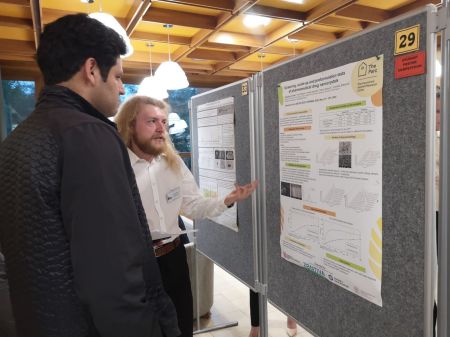
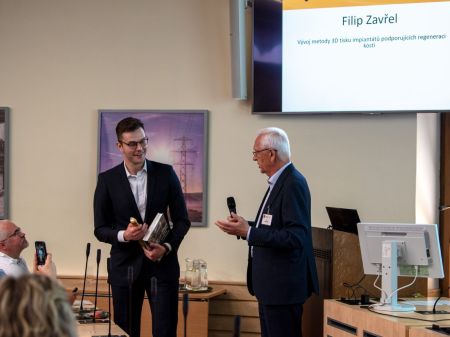 The great success of our students
The great success of our studentsDay 1:
- Ondřej Dupal (1st place)
- Lukáš Kamenský (2nd place)
- Lucie Večerková (3rd place)
Day 2:
- Dominik Králík (1st place)
- Lucie Pilíková (2nd place)
Day 3:
- Filip Zavřel (1st palce)
Congratulations!
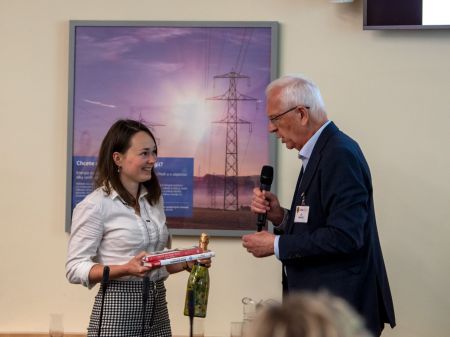

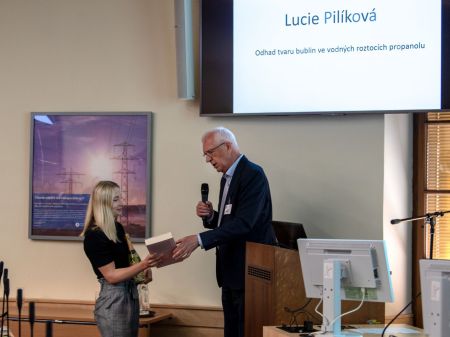
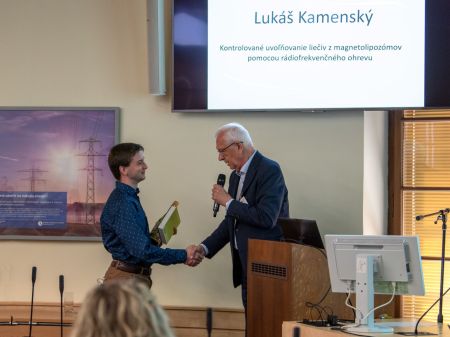
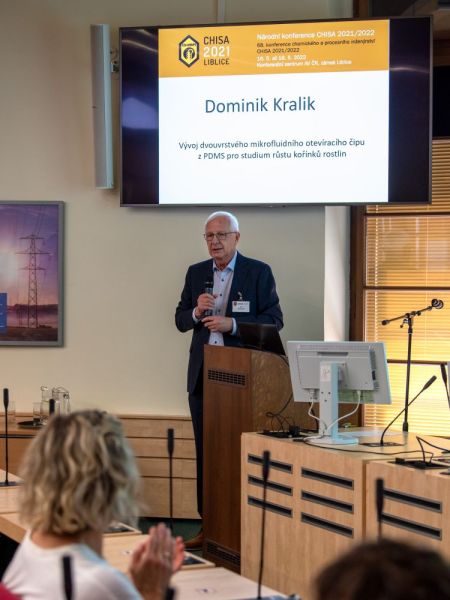
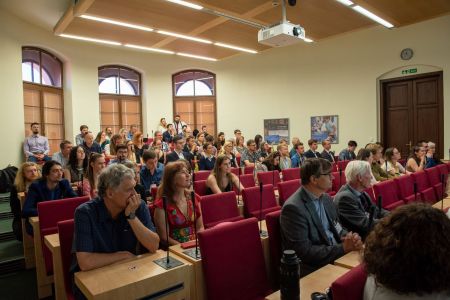
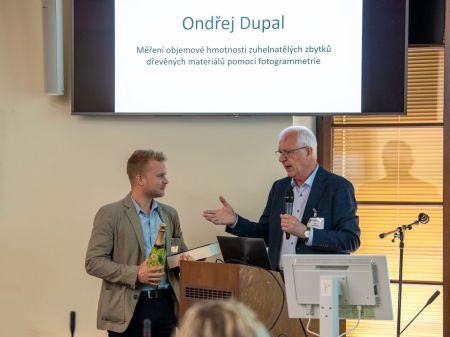
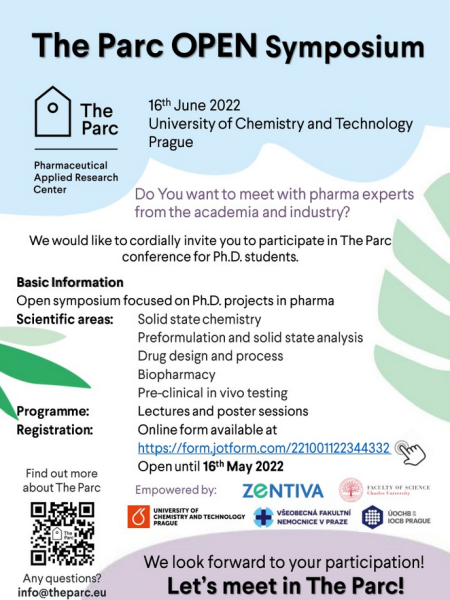
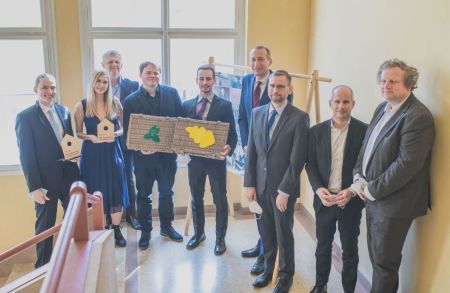 The Parc Awards Zentiva celebrates the next generation of scientists
The Parc Awards Zentiva celebrates the next generation of scientists 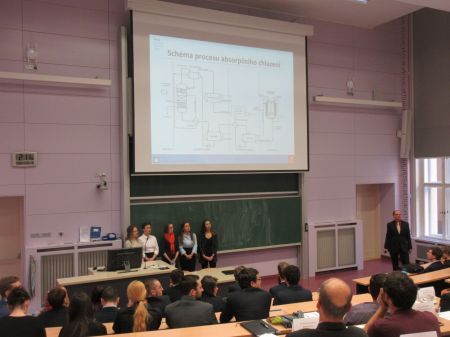 Defense of process projects
Defense of process projects This year's defenses of the Process Projects took place on Tuesday, January 18, 2022 from 1:00 pm in the AII auditorium. Students presented the results of their work in the form of 15-minute presentations, followed by an equally long discussion. Representatives of 15 companies formerly or now cooperating with our department also took part in the defense.
The following 6 projects are summarized in the proceedings (in Czech only)
|
1 |
Optimalizace průtočného chlazení |
Contipro a.s |
|
2 |
Vliv kontaktu katalyzátoru se stěnou trubky v R302 na její lokální přehřátí |
Spolana s.r.o. |
|
3 |
Spotřeba tepla – páry při hvozdění zeleného sladu ve sladovně Prazdroj |
Plzeňský Prazdroj a.s. |
|
4 |
Využití odpadního tepla z výroby |
Synthos Kralupy a.s. |
|
5 |
Optimalizace odpařovacího systému na výrobně ledku vápenatého v Lovochemie, a.s. |
Lovochemie a.s. |
|
6 |
Study of urea melt transport |
Casale Project a.s. |
 Study Chemical Engineering and Bioengineering with us!We offer a two-year MSc programme
Study Chemical Engineering and Bioengineering with us!We offer a two-year MSc programme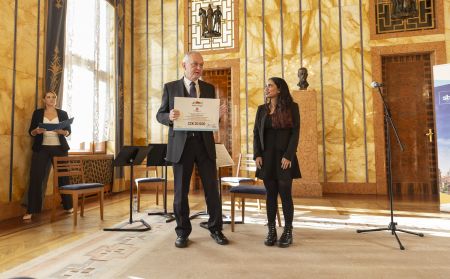 Our student Ashley George
Our student Ashley George On Friday, December 3, 2021, the Study in Prague university consortium organized an award ceremony for the extraordinary scholarships of prof. Miroslav Vlček. Among the scholarship recipients at the Prague City Hall Mayor's Residence was a student of UCT Prague – Ashley George.
Miroslav Vlček's scholarship is awarded to commemorate a professor and longtime vice-rector for external relations of the Czech Technical University in Prague, who established and developed the Study in Prague project between 2015-2019. The merger of 7 Prague public universities contributed to a higher internationalization of the university environment and attracted hundreds of international students to the Czech capital.
This prize is presented to international degree-seeking students that, in addition to their study obligations, contribute to sharing the good name of universities in Prague. As a student ambassador, Ashley has been a long-term partner of the International Department. She is not only a reference point for prospective students, but also helps with the organization of promotional events, and participates in the integration process of incoming international students.
Study in Prague
At UCT Prague
Do you also want to get an internationally recognized degree? The admission procedure for English study programs at UCT Prague is open from January 15 to February 28, 2022. Visit our website study.vcht.cz for more information.
At other universities
If you are also interested in other fields of study at Prague universities, refer to the Study in Prague website directly.
Photo credit: Zuzana Markéta Macková, AMU
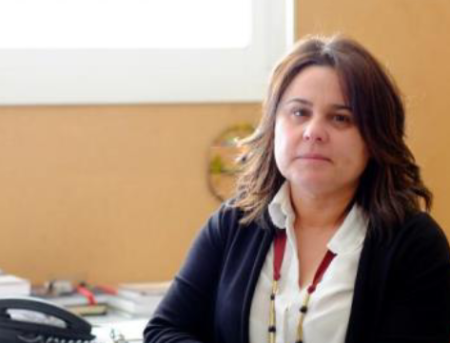 Seminar invitation 9.11. 16:00, Uhelna Microencapsulation: A World of Possibilities & Versatility of Sustainable Strategies for the Production of Tailored Materials
Seminar invitation 9.11. 16:00, Uhelna Microencapsulation: A World of Possibilities & Versatility of Sustainable Strategies for the Production of Tailored Materials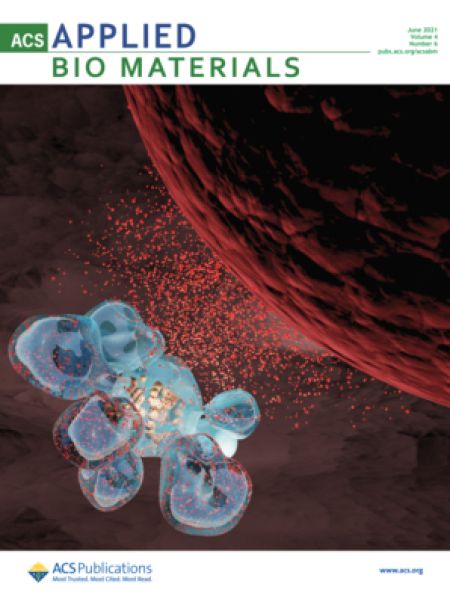 Multilobed liposomes on ACS front cover
Multilobed liposomes on ACS front coverMany congratulations to a team of authors lead by Denisa Lizoňová for having their work titled “Multilobed Magnetic Liposomes Enable Remotely Controlled Collection, Transport, and Delivery of Membrane-Soluble Cargos to Vesicles and Cells” feature on the front cover of ACS Applied Bio Materials. The work described new multi-compartmental liposome structures that can transport both hydrophilic and lipophilic molecular payload by means of magnetic navigation. Crucially, the paper demonstrates the ability of these structures to deliver membrane-soluble substances to cancer cells with a high efficiency.
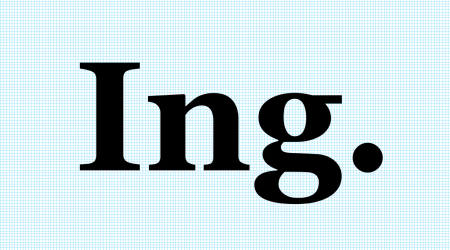 Inženýr = Engineer27 master students finished their studies by final state exam and thesis presentation and were awarded title "ING." Congratulations!
Inženýr = Engineer27 master students finished their studies by final state exam and thesis presentation and were awarded title "ING." Congratulations!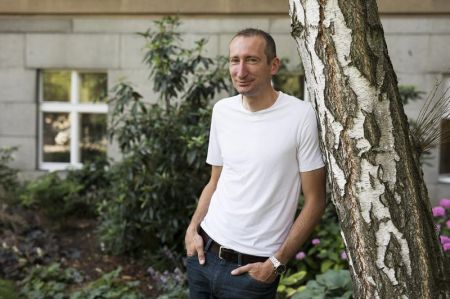 Prof. František Štěpánek
Prof. František ŠtěpánekThe head of our Department of Chemical Engineering, prof. Ing. František Štěpánek, Ph.D., is currently a visiting Fulbright Scholar at Rutgers University, New Jersey. Watch on a public talk "Trends and challenges of industrial pharmacy today" as a part of Czech Science Café New York.
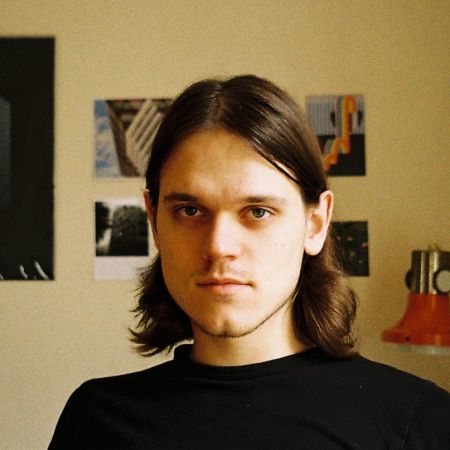 Success of Lukáš Šatura at mathematical competition SVOČ
Success of Lukáš Šatura at mathematical competition SVOČStudent of the second year of master's degree Chemical Engineering and Bioengineering Lukáš Šatura has - as a sole representative of UCT Prage - participated in student competition "SVOČ 2021" in mathematics and physics organized by the Faculty of Nuclear Sciences and Physical Engineering CTU Prague and with his work "Thermodynamically Consistent Modelling of Phase Separation Process" has placed third in section "Applied mathematics - numerical analysis and mathematical models of dynamics". Congratulations and all the best in your future career!
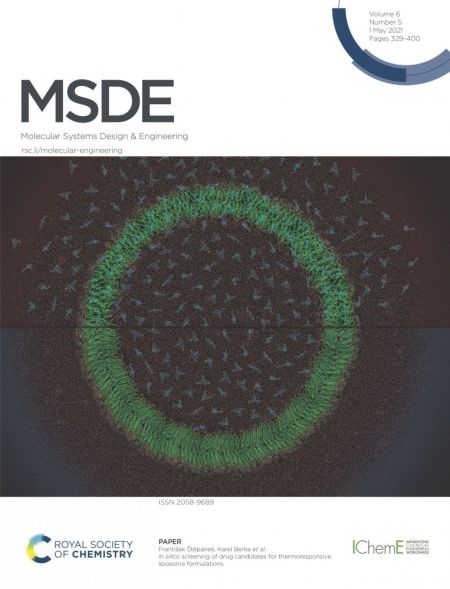 Liposome research of Martin Balouch and his colleagues
Liposome research of Martin Balouch and his colleaguesMany congratulations to our PhD student Martin Balouch on his publication “In-silico screening of drug candidates for thermoresponsive liposome formulations”, which has been selected for the front journal cover of Molecular Systems Design and Engineering, published by the Royal Society of Chemistry. The work, which was carried out in collaboration between VŠCHT Praha and Palacký University in Olomouc and supported by The PARC, reports on a computational methodology for the selection of active pharmaceutical ingredients that are suitable for encapsulation into liposomes based on stability, capacity and permeation rate. This computational methodology has the potential to accelerate the development process of new medicines, and improve the efficacy and bioavailability of active pharmaceutical ingredients via delivery in liposomal formulations. Well done all authors for this important piece of work!
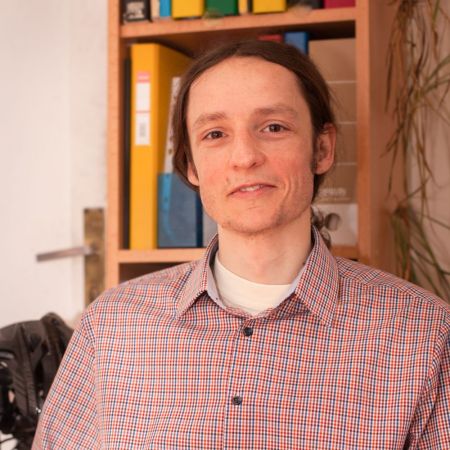 Petr Kočí
Petr Kočí The Parc
The Parc“Our achievements rocked science in 2020. I am proud of every student in The Parc and I would like to thank all the supervisors from Zentiva and the academia for the student’s supervision and enthusiasm to solve current challenges in pharmaceutical science together. The Parc´s research clearly addresses the key challenges the pharma industry is facing today and its results are directly applied in the new products development and manufacturing” – said Ondrej Dammer, The Parc’s Operational Director.
For the third time, The Parc doctoral students were awarded The Parc Awards in two categories. Tereza Boleslavská won The Student Choice Award for her project on “Development of biorelevant in vitro dissolution method” while the second Student award went to Jan Jirát for “Crystal design and crystallization process development” and the third Student prize was awarded to Jakub Petřík for his work on “Forced degradation study system development”. The Expert Choice Award went to Jiří Kolář for his work “Mathematical modeling of unit operations in pharmaceutical formulation processes”.
Prof. František Štěpánek, The Parc’s Scientific Director commented: “I would like to congratulate the winners and all the students for their 2020 research studies and results. At The Parc we continue to provide a bridge between excellent basic research in pharmaceutical sciences and its translation to real pharmaceutical products that can be clinically tested, registered, and manufactured. Through collaboration with the best academic institutions across the EU our platform provides its Ph.D. students with the opportunity to gain first-hand experience of both academic and industrial R&D environment, thus broadening their future career prospects. It is great to acknowledge that The Parc alumni launch successful careers not only in the pharmaceutical industry and academic institutions across Europe, but this year also the first technological start-up company was founded by one of our graduates.”
Zentiva strongly believes that supporting students by bridging the gap between theoretical science and what happens in the real-life in pharma will have a valuable impact on the future careers of young people, especially members of the Z generation in the Czech Republic. The high quality of the students’ program and its practical benefits were also recognized by Prime Minister Andrej Babiš during his visit to The Parc last September.
“From the superb quality of research receiving this year´s awards, it is clearly visible that the Parc is already fulfilling its mission to build a strong foundation for further growth of the pharmaceutical industry in the Czech Republic. The unique combination of world-class academic education with practical hands-on industrial and business experience in The Parc clearly shows a functional and successful example of how to speed up the transfer of academic research into practical applications in the industry, boost the research and development activities in the companies and prepare the next generation of scientists and engineers to be ready at their graduation to tackle the industrial challenges of the future. The Parc shows one of the ways we can really deliver on the “country for future” strategy of the Czech Republic” - summarized Pavel Sebek, Zentiva's Development Director and one of the founders of The Parc.
About The Parc
Initiated by Zentiva, The Parc was created in association with three academic partners: the University of Chemistry and Technology Prague; the Faculty of Science of Charles University; and the Institute of Organic Chemistry and Biochemistry of the Czech Academy of Sciences. This highly successful initiative has brought rising talent together with leading pharmaceutical and academic experts, all working to accelerate innovation in drug research & development.
The Parc provides world-class academic education combined with practical hands-on industrial and business experience under the leadership of scientists, engineers, and managers both from academia and the pharmaceutical industry. It enables students to gain graduate-level training in pharmaceutical sciences bridging chemistry, pharmaceutical technology, bio pharmacy, and clinical research. Results of the students’ research are frequently directly implemented in real-world products launched to the market to help patients. Collaborating with academic partners across Europe, The Parc also offers secondments for students and research experience exchanges supervised by top academic scientists.
More information about The Parc can be found on www.theparc.eu.
About Zentiva
Zentiva is a producer of high-quality affordable medicines serving patients in Europe and beyond. With a dedicated team of more than 4,500 people and a network of production sites - including flagship sites in Prague, Bucharest, and Ankleshwar - Zentiva strives to be the champion of branded and generic medicines in Europe to better support people’s daily healthcare needs.
At Zentiva it is our aspiration that healthcare should be a right and not a privilege. More than ever, people need better access to high-quality affordable medicines and healthcare. We work in partnership with physicians, pharmacists, wholesalers, regulators, and governments to provide the everyday solutions that we all depend on.
Source: Zentiva Press Release
 Study Chemical Engineering and Bioengineering with us!We offer a two-year MSc programme
Study Chemical Engineering and Bioengineering with us!We offer a two-year MSc programme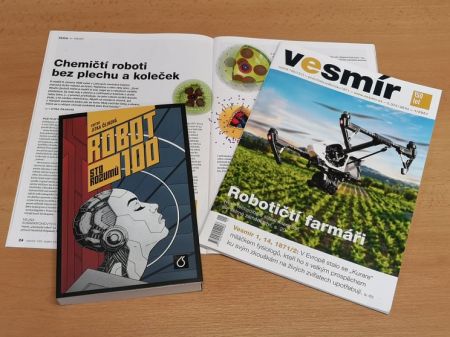 Two articles in "Vesmír" journalAbout chemical, hydrogel and liquid robots and about the book Robot100
Two articles in "Vesmír" journalAbout chemical, hydrogel and liquid robots and about the book Robot100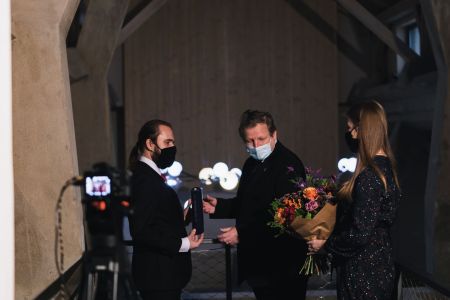 The Rector's Awards 2020 For our PhD student Vojtěch Šálek. Congratulations!
The Rector's Awards 2020 For our PhD student Vojtěch Šálek. Congratulations!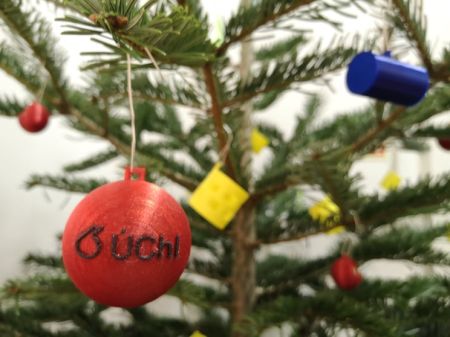 Christmas tree in the secretary officeThis year with cool 3D printed chemical-engineering decoration!
Christmas tree in the secretary officeThis year with cool 3D printed chemical-engineering decoration!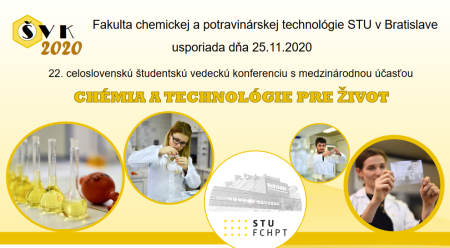 Congratulations to Pavlína Michaláková and Lukáš Šatura
Congratulations to Pavlína Michaláková and Lukáš Šatura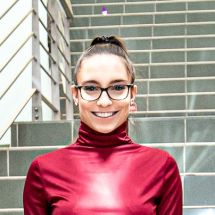
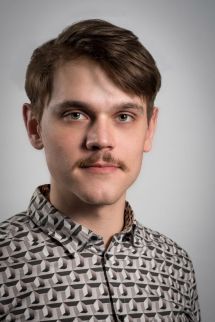
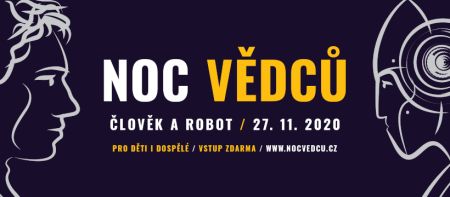 Night of Scientists
Night of ScientistsIvan Řehoř: Mikrorogel robots
Jitka Čejková - Robot 100: Sto rozumů (book)
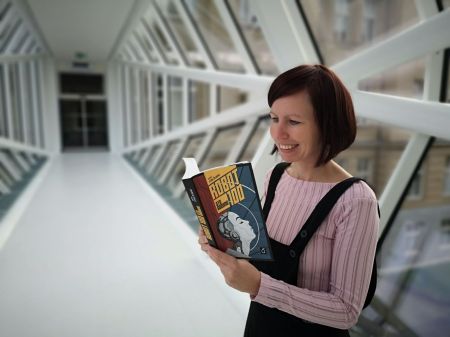
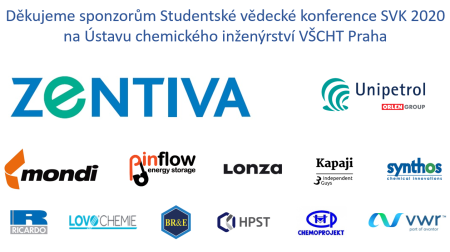 Student Scientific Conference 2020This year 72 students in 8 sections presented their results
Student Scientific Conference 2020This year 72 students in 8 sections presented their results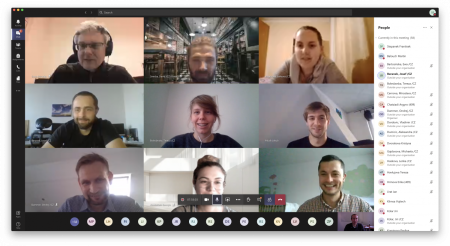 The Parc symposium
The Parc symposiumEven in these difficult times, we decided not to break our tradition and held the regular The Parc symposium! We had 29 presenting PhD students, this time we were also joined by potential future applicants and representatives from the Pharmaceutical Faculty of Charles University, Faculty of Science of Masaryk University and Pharmaceutical Faculty of Masaryk University. We thank all the presenters and hope our guests had an enlightening experience! On the photos, you can see some of our members in their native environments...
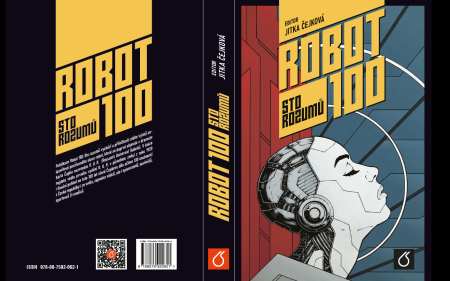 Book ROBOT 100 edited by Jitka Čejková
Book ROBOT 100 edited by Jitka Čejková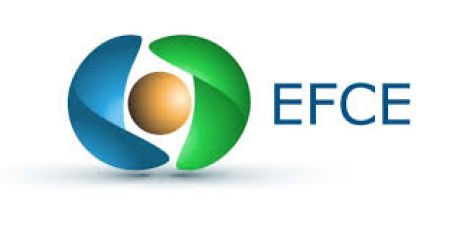 Webinars of the European Federation of Chemical EngineersAttendance is free.
Webinars of the European Federation of Chemical EngineersAttendance is free.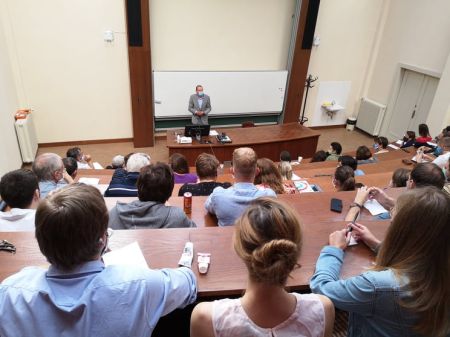 Coronavirus
Coronavirus
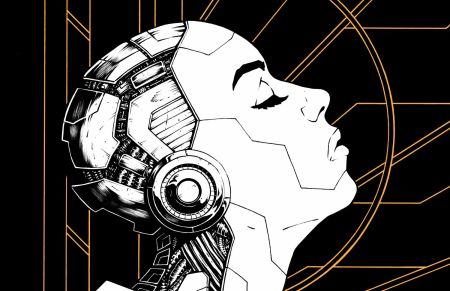 Book ROBOT 100 and conference ALIFE 2021
Book ROBOT 100 and conference ALIFE 2021Artificial life (commonly abbreviated Alife) is an interdisciplinary field that can be most briefly described as the study of life as it could be as opposed to the biology, which studies life as we know it here on Earth. This is a fascinating field where topics range from artificial intelligence and robotics to the chemical synthesis of artificial cells to almost philosophical considerations (what exactly is life?). In the Alife community, one encounters computer scientists, robotics researchers, physicists, chemists, biologists and also representatives from humanities disciplines and even artists. ALIFE conferences have been held annually since the 1980s, when the first conference was hosted by Christopher Langton, one of the founders of the field, in Los Alamos, United States.
Originally, this year’s conference was supposed to take place in Montreal, Canada, but due to the current situation and limited opportunities to travel, it was moved online to become the first fully virtual ALIFE conference. Next year the University of Chemistry and Technology, Prague (UCT Prague), will organize the conference. I am optimistic about the future, so we are planning ALIFE 2021 as a hybrid conference. This means that the conference will take place in Prague but that those who will not be able to in-person will be able to participate virtually. However, it will not be the first hybrid ALIFE conference: already starting in 2019 for the Newcastle (U.K.) event, scientists from the ALIFE community could choose whether to attend in-person or to choose a more environmentally friendly option by attending lectures online. We believe that the hybrid format will eventually become common for all conferences.
Although artificial life does not have much of a tradition in the Czech Republic (and currently only I and a handful of CIIRC scientists are supporters of this field), next year’s event will be the second international conference on artificial life to take place in the country. The first, ECAL (The 6th European Conference on Artificial Life), was organized by Jozef Kelemen in 2001. The ALIFE conference will therefore “return” to Prague after 20 years and its theme this time will be the celebration of the hundredth anniversary of Čapek’s R.U.R. (Rossum’s Universal Robots), source of the globally used word “robot”, which first appeared in this work.
Anyone who has read Čapek’s play or seen it in a theatre knows that Rossum’s robots were not metal monsters, as many people imagine robots imagine, but were made of chemically prepared matter that behaved as if it were alive. The play states: “Nature has found only one way to organize living matter. However, there is another way, simpler, more malleable and faster, which nature has not encountered at all.” With a little exaggeration, it could be said that Karel Čapek formulated some of the ideas and goals of the scientific field of artificial life as early as 1920. In R.U.R., we find many topics that scientists are still dealing with today: whether it is the processes of synthesis of artificial tissues and organs, questions surrounding evolution and reproduction, the ability to imitate the behaviour of human beings and to show at least signs of intelligence or consciousness. R.U.R. also outlines societal issues related to globalization, the division of power and wealth, religion, and the status of women. Basically, almost every scientist could show an example of how R.U.R. opens one of the still unanswered questions in their area of investigation. And that’s exactly what I did! At first I decided to recall how this hundred-year-old play is related to chemistry, but later I began to relate individual ideas to artificial life and other fields. I contacted my colleagues and acquaintances and asked them to read the Čapek's original R.U.R. (especially abroad, many had no idea about this work) and then to write their commentaries about it. And so the book Robot 100 was created.
From last autumn to January this year, I collected a total of 86 short chapters and several illustrations from 100 personalities—not only scientists, but also fiction writers, journalists, athletes, and artists. About a third are Czechs; the other authors come from all over the world. If we look at it like the Olympics symbol with its five interlocking rings, there are representatives from all five continents in the book. You will be able to find out who and what they contributed to the book on the website www.robot100.cz and social media. From now until November, the details about the book Robot 100 will be gradually released. And the book itself will see the light of day in November 2020, exactly one hundred years after the book edition of Čapek’s R.U.R. For now, I will tell you that the author of the cover of Robot 100 is the well-known Czech illustrator Jonáš Ledecký.
The Czech version of Robot 100 will be published by us at the UCT Prague Press. UCT Prague is the largest chemistry oriented university in the Czech Republic, which focuses not only on teaching and research in chemistry, chemical technology, biochemistry, biotechnology, and materials engineering, but also gives us, researchers, the ability to explore relatively new fields such as artificial life, as mentioned above. The UCT Prague Press, headed by Ing. Eva Dibuszová, PhD, is the only specialized publishing house in the Czech and Slovak Republics that systematically publishes chemical literature. In addition to coursepacks and textbooks, the publishing house also publishes conference proceedings and books for the general public.
It is terrific that our university’s publishing house has included Robot 100 in its publishing plan for this year. I am glad that, here at UCT Prague, we will be able to commemorate Čapek’s original concept: that his R.U.R robots originated by chemical means, and that for the first time, the word “robot” was used essentially for a chemical invention, albeit only a fictitious one. However, we are not the only ones planning to celebrate the centenary of the word “robot”. I am collaborating, for example, with Zdeněk Vacek, director of the Karel Čapek Memorial, where various events are planned in this context for autumn 2020. In January 2021, Jiří Dědeček and Jaroslav Veis will hold a several-day conference at the Archa Theater to celebrate 100 years of R.U.R. Some other authors and I will give lectures at events for the general public, especially during November’s “Night of Scientists”. I collaborate with Jana Horáková from Masaryk University in Brno, who wrote an amazing book, Robot as Robot, about R.U.R. from the theatre studies perspective. And the highlight of all this will be the ALIFE international conference, which will take place in Prague in summer. And at that time, the English version of Robot 100 will be published.
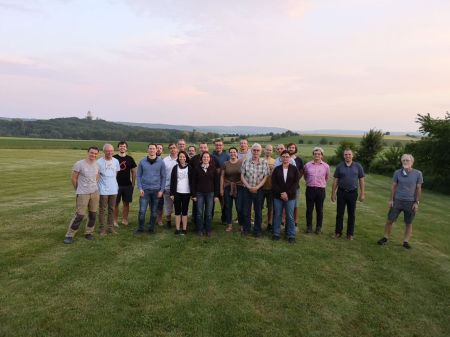 Teambuilding 2020
Teambuilding 202022 teachers from our department spent two half days out of Prague to intensively discuss about topics related to education and research at our Department of Chemical Engineering.
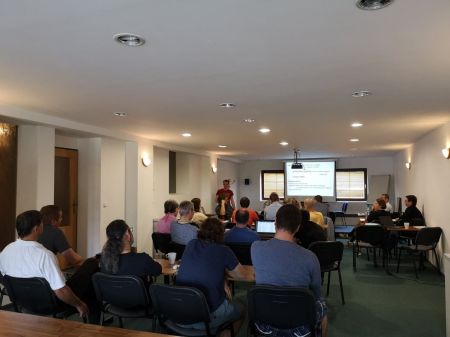
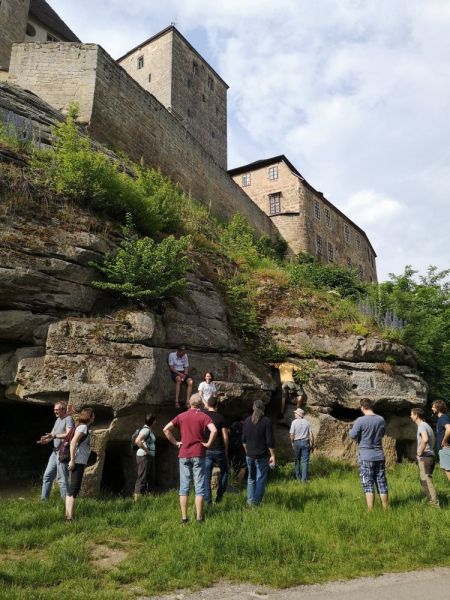
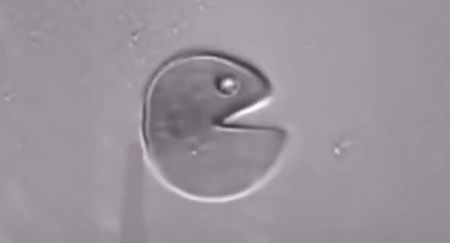 Hydrogel microrobots driven by lightRead on microscopic hydrogel crawlers in Ivan Řehoř's paper
Hydrogel microrobots driven by lightRead on microscopic hydrogel crawlers in Ivan Řehoř's paper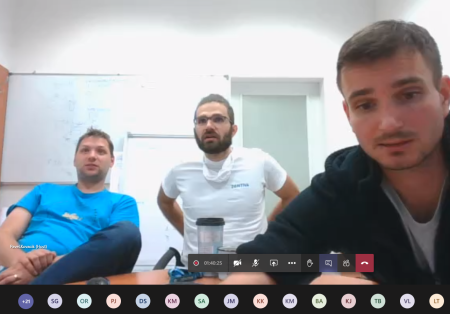 Virtual excursions 2020
Virtual excursions 2020This year master students visited three companies only virtually. MS Teams platform was used for the group meeting with the absolvents of our department and representatives of Evonik (Dr. Robert Jahn), Zentiva and The Parc (Dr. Jiří Dohnal, Dr. Pavel Kovačík and Dr. David Smrčka) and Škoda (Dr. František Plát and his colleagues).
Many congratulations to the glucan team from Chemical robotics laboratory for being awarded a national patent on a new process for drug encapsulation by spray drying. The patent titled “Method of producing composite beta-glucan particles with incorporated poorly water soluble drug, pharmaceutical preparation and use thereof” by inventors Gabi Ruphuy, Petra Šalamúnová, Ivan Saloň, Jarda Hanuš and František Štěpánek has been registered under no. CZ 308357.
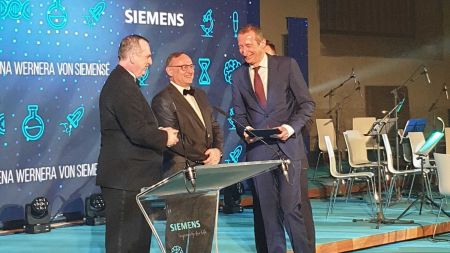 Werner von Siemens Awards 2019The best teacher: František Štěpánek, 2nd diploma thesis: Martin Balouch
Werner von Siemens Awards 2019The best teacher: František Štěpánek, 2nd diploma thesis: Martin Balouch
